INNOVATING SECURITY
Mustapha Koaik, Country Manager, Saudi Arabia at Ipsotek, tells us how its AI-driven solutions are revolutionising the security and operations landscape
PROACTIVE PATROL
How is AI turning surveillance into preemptive security?
SECURING EQUALITY
Empowering Women to Diversify the Security Workforce


Issue 127 July/August 22 ISSUE 137 MAR/APR 24
Powered by SAFE –The National Security Services Company

CONTACT US
EDITORIAL
Publisher Barry Bebbington +44 1708 229354 Barry@pubint.co.uk
Editor
Cora Lydon +44 7834 244613 cora.lydon@securitymiddleeastonline.com
ADVERTISING
Worldwide
Mike Dingle
+44 1752 267330 mike@securitymiddleeastonline.com
Gareth Driscoll +44 1752 260603 gareth@securitymiddleeastonline.com
Ryan Bickerton +44 1752 265802 ryan@securitymiddleeastonline.com
Rahul Vara
+44 1752 604352 rahul@securitymiddleeastonline.com
Marketing Manager
Paul Riglar
+44 7496 377603 paul@securitymiddleeastonline.com
Digital Editor
Britt Jones
britt@securitymiddleeastonline.com
PUBLISHED BY
Publications International Ltd +44 1708 229354 166 Front Lane, Upminster, Essex, RM14 1LN, UK
This publication may not be reproduced or transmitted in any form in whole or in part without the written consent of the publishers.
© Publications International Ltd. 2024
For subscriptions and advertising enquires, or for further information on the magazine visit our website at: www.securitymiddleeastmagazine.com
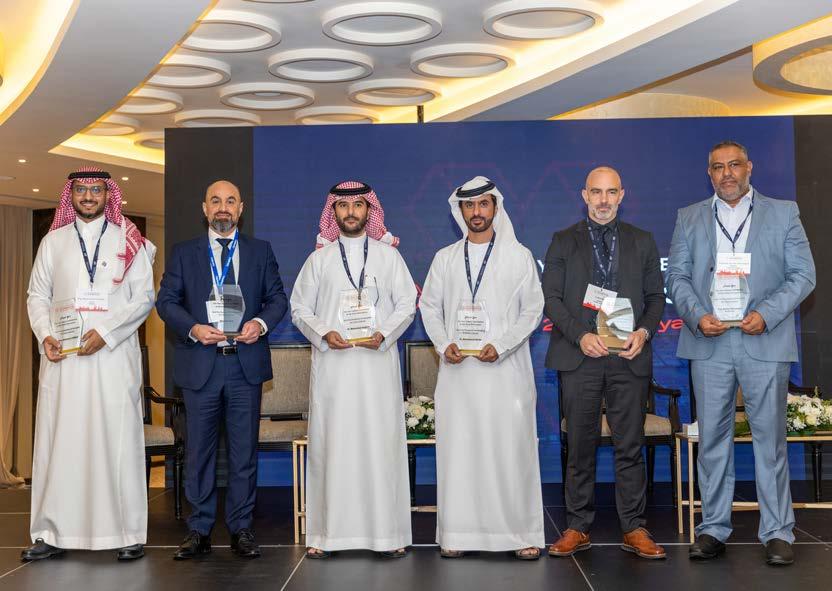
UP FRONT
We are so excited to be bringing you the second annual Security Middle East Conference next month, powered by our Strategic Partner SAFE – The National Security Services Company. We have lined up sector-leading experts, luminaries and innovative thought leaders to share their thoughts and ideas with our hand-picked audience. With the help of our advisory board we’ve carefully curated a compelling agenda tackling the biggest issues in our industry: how security professionals can prepare for major events and increased tourism; how to build resilient cities and future-proof the region’s giga projects; building a greener, more secure future; promoting and developing diversity in the security workforce; and preparing for GenAI threats and building cyber resilience.
We also have some exciting speakers lined up to deliver keynote speeches, as well as two informative workshops, ensuring our delegates leave the event having boosted their own career development. All the information about the upcoming event starts on page 17 –
take a look and if you’ve not yet registered to join us now is your opportunity –www.securitymiddleeastconference.com. We’ll be dissecting the sector on May 14th at the InterContinental Hotel Riyadh.
Aligning with one of our conference topics we are delighted to have had the opportunity to speak to so many amazing women who are sharing their thoughts on what it’s like to be a woman working in the security sector and what more needs to be done to drive inclusion, diversity and equality. Take a look at page 34.
Next issue we’ll be bringing you the highlights of the Security Middle East Conference.
Cora Lydon Editor cora.lydon@securitymiddleeastonline.com

smemag Security
SECURITY MIDDLE EAST | MARCH/APRIL 2024 | 3
Middle East Magazine
MONITOR
03 Up front
Foreword from the Editor
07 News Monitor
The latest regional and international security news
11 Market Monitor
A roundup of the latest security products and solutions
14 Cover story: Ipostek
Mustapha Koaik, Country Manager, Saudi Arabia, at Ipsotek, speaks to Security Middle East magazine about its ambitions for the region and its transformative mindset
FEATURES
17 Security Middle East Conference 2024
Read the latest updates to this groundbreaking event. Find out who our expert panellists are, learn more about the thought leaders delivering keynote speeches as well as our sponsors and the topics we’ll be covering


30 Increasing synergy between IT and physical security departments
RecFaces looks at how to converge IT and physical security successfully for improved business resilience
34 Empowering change
Find out more about the women who are shattering boundaries in the security workforce
38 Proactive Patrol
How can security teams use augmented reality to boost their video surveillance platforms? Stefan Lundberg, Senior Expert Engineer at Axis Communications, explores how combining the two can help create smarter, safer environments
44 Unlocking the business value of security
Daniel Norman, from the ISF explores how security professionals can realise the value of security more clearly

46 Case study: SentinelOne/ Aston Martin Aramco F1
When the Aston Martin Aramco Formula One Team needed to secure its operations and adopt AI threat hunting into its security architecture it adopted SentinelOne’s Singularity Platform
48 Why IoT matters in physical security
Firas Jadalla, Regional Director META at Genetec, covers best practices on how to bring together an organisation’s IoT/IIoT data to generate meaningful outcomes and deliver big gains while at the same time mitigating cybersecurity risks
CONTENTS
17 30 46
4 | SECURITY MIDDLE EAST | MARCH/APRIL 2024
ISSUE 137 MARCH/APRIL 2024
Strategic Partner


CYBER MONITOR
52 Cracking the AI security code
As more and more companies use AI, they open themselves up to adversarial machine learning attacks (AML), Manpreet Dash, Global Marketing & Business Development Lead, Bosch AIShield, asks what do we need to consider when securing AI?
56 Cyber defence blueprint
Find out how UAE startups can build their cyber defences with advice from Hexnode’s Apu Pavithran
INDUSTRY MONITOR
55 Focus on: professional development
Meshal Aljohani of Aramco, talks to Mike Hurst, Director, HJA Consult about professional development for those working in security
58 Diary
THIS ISSUE’S PARTNERS & CONTRIBUTORS
SAFE
SAFE – The National Security Services Company is owned by The Public Investment Fund and was established in 2019. Its mission is to lead the transformation of the security services ecosystem and to promote and transform the security services sector through a consultative approach and by offering best-in-class security solutions. Its vision is to be the ultimate security partner leading the transformation of the security ecosystem. SAFE is joining the Security Middle East Conference as our Strategic Partner.
Contributors



Sponsors
Mustapha Koaik
Country Manager, Saudi Arabia, Ipsotek
Mustapha Koaik has worked at Ipsotek for two and a half years, helping to drive growth in the region.
Daniel Norman
Regional Director, EMEA, Information Security Forum (ISF)
Daniel Norman’s role at the ISF is to help organisations to manage current and emerging cyber risks.
Manpreet Dash
Global Marketing & Business Development Lead, AIShield
Manpreet Dash is the business development lead for AIShield, a Bosch startup empowering organisations to adopt AI with confidence.
Diary dates for forthcoming security exhibitions, conferences and events Partners

CONTENTS
38
SECURITY MIDDLE EAST | MARCH/APRIL 2024 | 5 GOLD SPONSOR GOLD SPONSOR SILVER SPONSOR DIGITAL FORENSICS PARTNER GOLD SPONSOR

Meet Convergint Middle East experts at Security Middle East Conference - Riyadh
14th May
InterContinental Hotel Riyadh 9:00 AM - 4:00 PM WE ARE REVOLUTIONIZING ADVANCED





Know more about Convergint AI Software Systems Integration Solutions IT Infrastructure Physical Security Data Centres Audio-Visual
SOLUTIONS TO BE YOUR BEST SERVICE PROVIDER IN THE REGION

Netskope appoints new advisor for Middle East initiatives
and tightened defences – especially in the context of digital transformation and implementation of cybersecurity protocols. With a history working in both the Middle East and global cybersecurity landscapes, I am looking forward to promoting innovative and comprehensive cloud-native solutions as part of the Netskope team.”
The expansion comes at a time of rapid growth for Netskope; which has expanded its EMEA team significantly, bolstering the regional leadership in order to better support local organisations in their adoption of Security Service Edge (SSE) on their journey to SASE. www.netskope.com
Saudi and UAE top APT target list

Saudi Arabia and the UAE have topped the list of APTtargeted nations in the Middle East, according to analysis by Positive Technologies. Over the past two years, 16 advanced persistent threat (APT) groups have targeted organisations in the Middle East, with the cyberattacks focusing on government agencies, as well as the manufacturing and
AI threats highlighted
energy sectors. Yana Avezova, Senior Information Security Analyst, Positive Technologies, said: “Companies should pay attention to what tactics and techniques which APT groups attacking the region are using. Companies in the Middle East region can understand how these groups typically operate and prepare for certain steps accordingly.” www.ptsecurity.com
in January. The figures highlight the popularity for organisations to adopt AI tools, yet alongside this there are mounting security risks and an increasing number of worrying data protection
incidents. While the UK leads enterprise AI traffic in the EMEA region with a 20% share, the UAE has proven itself to be a rapidly expanding technological innovator, and a prominent adopter of AI tech.
MONITOR NEWS
SECURITY MIDDLE EAST | MARCH/APRIL 2024 | 7
In Brief
KUWAIT
With mandatory biometric fingerprinting set to expire in June, Kuwait has launched biometrics services at home for certain people who are unable to visit Interior Ministry centres. The initiative is particularly targeting the elderly and those who are unwell.
SAUDI ARABIA
According to Fahad Al Guthami, CEO, American Express Saudi Arabia, the regulation of ecommerce and strong electronic security has pushed the ecommerce growth rate up in the region – with the company recording a 62% rise during 2023.
BAHRAIN
Bahrain authorities have declared a massive uptake of digital ID and civil registration services using digital platforms during 2023. Over the course of the year there were 743,000 identity transactions completed online.
UAE
Novelty Group has announced a joint venture with Hexaware Technologies to deliver cutting-edge digital transformation services to UAE enterprises. The partnership will leverage Hexaware’s technological capabilities and Novelty Group’s local presence and market understanding.
DUBAI
Dubai Police has signed a Memorandum of Understanding (MoU) with the Economic Security Centre of Dubai (ESCD) to boost collaboration and coordination between the two parties in the exchange of information to help combat financial crimes. Faisal Selaitin, Executive Director of the ESCD, who signed the agreement said: “It also enables the development of effective strategies to combat them aligned with the wise vision leadership to safeguard the country’s financial and economic system.”
Security spotlight
INTERNATIONAL NEWS
ISC West 2024 saw a host of companies take centre stage to showcase their security innovations at the Venetian Expo in Las Vegas 10-12 April. Companies exhibiting their newest releases include:
• Sielox showcased its pre-emptive, intelligent and advanced layered access control security solutions, including the latest release of AnyWare, a browser-based access control monitoring and event management solution.
www.sielox.com
• Morse Watchmans presented its Emergency Key Grab (EKG) Kit, designed to facilitate a swift emergency response in the event of a facility lockdown. It also showcased its range of key control and asset management solutions.
www.morsewatchmans.com
• Barrier1 Systems took an impressive lineup of crash-rated barriers to the event, allowing attendees to see firsthand the range of products, including fixed and retractable bollards, security folding gates and drop arms.
www.barrier1.com

• Viakoo highlighted the new IoT applications-based discovery capabilities of its Viakoo Action Platform, which greatly accelerates the time to discover potential threats and impending device issues.
www.viakoo.com
• Iris ID put its newest advancements in identity detection and authentication technology under the spotlight. It emphasised its portfolio of multimodal iris and facial recognition solutions and debuted a new iris and face fusion device for access control and time and attendance industries. www.irisid.com
AMAG Technology introduces Symmetry Control Room
REGIONAL NEWS
AMAG Technology has launched its command and control software which simplifies security management and improves situational awareness. Symmetry Control Rooms allows administrators to manage the alarms and events of multiple security systems in real-time from a single monitor. Roland Fournier, AMAG Technology Vice President Product Management, said: “Symmetry Control Room provides dynamic situational awareness for enterprise users needing to manage multiple systems simultaneously. With its exceptional alarm management, adaptable user interface, robust graphical and workflow functionalities, it enhances operational efficiency, fostering greater responsiveness and maximising return on investment.”
SURVEILLANCE | UNDER VEHICLE MONITOR NEWS
8 | SECURITY MIDDLE EAST | MARCH/APRIL 2024
Manufactured, Tested, Specified, Certified
Sunray is the specifiers choice for Steel Security, Fire and Blast Doors, Louvre Panels/Facades and Steel/GRP Platforms and Walkways. Our comprehensive Steel Door Range and associated products provides Fire Ratings for up to 4 Hours plus overrun and Security Ratings from SR1-SR6.
We lead the industry with our Door Size Ratios, which enables the Architect, Designer or Specifier to maximise infill without overpanel and creating clean sight lines, as well as practical ease of access for plant, machinery, and general use. With an extensive list of hardware and locking options, electro-mechanical access, vision panels, finishes etc. we tailor your criteria to deliver the required performance and practical solution.
● UTILITY

● TRANSPORT
● POLICE
● EMBASSY & CONSULATE
● PETROCHEM
● RETAIL
- sub-stations, transformer chambers, plant & pump rooms.
- rail, including underground, airport & ferry terminals.
- government & military, armouries, ranges, sensitive & secure buildings.
- UK & abroad.
- UK & abroad.
- staff / safe & stock rooms & financial institutions.
For more details, call our specialised team to discuss your
01233
sales@sunraydoors.co.uk www.sunraydoors.co.uk
particular project on:
639039


Powerful digital investigation solutions for businesses, supporting: • Internal/HR Investigations • Incident Response • eDiscovery Download our free Magnet Axiom Cyber trial magnetforensics.com

Forward Foundry launches to support tech entrepreneurs
As one of the founders of Darktrace Middle East, James Connolly set up Forward Foundry to help aspiring technology entrepreneurs and businesses open and scale their business in the region. Security Middle East magazine finds out more about the new business. “Did you know that in 2023, there were over 48,000 new companies registered here in Dubai alone? The Middle East is booming and we help clients tap into the incredible growth here,” explained Connolly. Forward Foundry helps clients win their first five to ten logos in the region.
Then, from there, advising on the ideal strategy when it comes to company setup, office space, hiring a team and the many aspects to growing a business in the region. He continued: “The 3 biggest challenges we see with clients is 1: They want more meetings with key decision makers, 2: They’re having meetings but the discussions are not moving forward fast enough and 3: They’re simply not sure how to approach the region when it comes to overall strategy and connections.” Since starting the business, Connolly and the team have worked with

Qognify adopts Hexagon’s corporate identity
Following its acquisition by Hexagon in April 2023, Qognify has officially adopted the Hexagon corporate identity and fully integrated into Hexagon’s Safety, Infrastructure & Geospatial division as the physical security business unit.
As a leading provider of physical security solutions, more than 4,000 organisations globally depend on Qognify’s video management software and physical security information management solutions.
Mladen Stojic, President of Government, Transportation, Defense
and Security at Hexagon’s Safety, Infrastructure & Geospatial division, said: “By rebranding and integrating Qognify into Hexagon, we are fostering a culture of innovation and collaboration. It will enable us to deliver cutting-edge technologies that will redefine the future of physical security and public safety. As one, we will unlock synergies for enhanced capabilities, bring added value to customers and expand our reach into additional markets.”
www.hxgnsecurity.com

Darktrace, Tekgem and Source Feed. “The market reaction has been incredible. We’re very excited to see what we can achieve with our clients,” he added.
www.forwardfoundry.io
Panzura targets ransomware with new release
Panzura has launched its near real-time ransomware detection and recovery solution, Panzura Detect and Rescue. The tool’s ransomware detection capabilities enable businesses to take a proactive stance against increasing threats. It combines powerful AIinfused detection software with expert-guided recovery, adding layers of ransomware resilience to the company’s hybrid cloud data platform, Panzura CloudFS. Should the worst happen and an organisation experiences a ransomware breach, the average recovery time is reduced to just hours, compared to the typical 21 days it takes to recover from such an attack.
www.panzura.com
MONITOR MARKET
SECURITY MIDDLE EAST | MARCH/APRIL 2024 | 11

3DX-Ray’s newest launch
This year’s Milipol Asia Pacific show saw 3DX-Ray unveil its new smaller ThreatScan AS2 flat panel. Talking of the launch, Vincent Deery, 3DX-Ray Ltd CEO, said: “We developed this panel in direct response to feedback from users of our systems. They were asking for a panel with all the capabilities of its larger counterparts, but small enough to able to be slipped under the seat of a car or between panels. So, the new detector has been specifically designed for operators working in areas where access is very restricted.” www.3dx-ray.com
Ajax Systems launches wired security IP cams

Ajax Systems has released its range of wired security IP cameras, designed to provide high definition surveillance while delivering high level privacy protections. The cameras – which include the TurretCam line, BulletCam line and DomeCam Mini line – are
i-PRO to support Genetec Security Center
i-PRO Co Ltd (formerly Panasonic Security) has announced support for Genetec Security Center SaaS, supporting new and existing camera models to utilise a flexible application approach for direct-to-cloud workflow. In addition to enabling Security Center SaaS support in its new edge AI-enabled cameras, it will also release an app for existing cameras. The application-based approach means i-PRO customers are not required to buy new cameras to support Security Center SaaS.
i-PRO AI cameras can deliver 98 different metadata attributes, including unique descriptions such as the colour of shoes and bags being carried or whether a person has a beard or not. The cameras also support various 3rd party analytic applications including video and sound to provide operators with unprecedented ‘event alarm’ capabilities for both people and vehicles.
www.i-pro.com
easy to set up, have an IP65 rating, and are secure thanks to passwordless authentication. Advanced streaming technology means cameras are synchronised with system events, giving customers quick access to video data. www.ajax.systems
Google targets security development
Google Cloud has appointed Noor AlSulaiti, to the role of security business development and government relations for the Middle East, Turkey and Africa. Al-Sulaiti, former chief executive of Ooredoo Oman, will spearhead the company’s cybersecurity expansion in the META region.
She said: “Google Cloud is continuously helping governments around the world enhance their security capabilities and respond holistically at the national level to keep their citizens and critical assets safe, and I’m ready to lead the charge to bring these capabilities to the Middle East, Turkey and Africa.” cloud.google.com
SURVEILLANCE | UNDER VEHICLE MONITOR MARKET
12 | SECURITY MIDDLE EAST | MARCH/APRIL 2024

Integrate Video Anywhere
Altronix has the solutions you need to integrate critical infrastructure and provide power for all your surveillance and security applications.
And our powerful LINQTM network management platform lets you remotely monitor and control all your devices from a single-pane platform.
We’ve got it all covered.
altronix.com YOU DESERVE BETTER
© 2024 Altronix Corporation. All rights reserved.
Pace™ Extended Range Ethernet
NetWay® PoE & Fiber Solutions
over
VertiLine™ Rack Mount Power eBridge™ Ethernet
Coax WayPoint™ Outdoor Power Solutions
Ipsotek’s innovations and transformative mindset
Security Middle East magazine spoke to Mustapha Koaik, Country Manager, Saudi Arabia, Ipsotek, an Eviden business, to find out more about the company’s ethos and plans for the future

With over two and a half years of experience in his role at Ipsotek, Mustapha is leading the company’s sales and business development in the Saudi Arabian market. Ipsotek, a pioneer in AI-powered video analytics, has a rich history of serving the Middle East market and meeting its unique demands.
Driven by a passion for advancing technology and creating a safer world, Ipsotek thrives on innovation. The company’s commitment to excellence positions it as a leader in the industry.
Mustapha’s unique perspective on the region, shaped by years of experience, allows him to anticipate shifts in the Saudi IT market. With a customer-centric mindset, Mustapha ensures that Ipsotek delivers the technological solutions to serve the Saudi market’s needs and contribute towards developments. His journey began as a GIS developer, working on municipal GIS web solutions. As his expertise in the Saudi software industry grew, he found his perfect fit with Ipsotek, where he continues to contribute to transformative advancements.
A key focus for Ipsotek is to develop AI powered video analytics solutions that enhance safety, security, and operational efficiency. Can you tell us how you achieve this?
The fundamental principle is that the people behind the technology drive innovation and success.
The technology industry constantly fluctuates, and within a short period, we
COVER STORY | IPSOTEK 14 | SECURITY MIDDLE EAST | MARCH/APRIL 2024
see rapid technological advancements, fierce competition and complex ethical considerations to adapt to; this is particularly true for an industry that integrates artificial intelligence at the core of its products, as Ipsotek does. Our approach ensures we keep pace with, and lead, technological advancements to foresee and shape future trends. Our team’s collective expertise and forward-thinking mindset empower us to develop AI powered video analytics solutions that are both cutting-edge and deeply aligned with our customers’ evolving needs. Some of our patents such as the Scenario Based Rule engine allow us to innovate with unique solutions that are not just tailored to specific needs, we often create opportunities and improvements based on such technologies, thus leading new trends.
How do you work with a client to ensure satisfaction?
At Ipsotek, we’re committed to providing our clients exceptional service beyond just offering cutting-edge technology. We believe in building meaningful relationships with our clients, understanding their unique needs and challenges, and delivering solutions that enhance their operations. In Saudi Arabia, it is all about the relationships and the trust you gain that takes you beyond the traditional business boundaries. We are in the Middle East, and emotional intelligence matters most, so being honest is my little secret, even if that doesn’t translate into a $ sign in some cases – value and trust is the main thing. I would also stress that our solutions bring tailored values across various industries; that we lead by value creation, not the $ sign; and that our customers and partners are at the heart of what we do.
Value isn’t just a magical stick that you can apply in different geographical regions and voila! It is about understanding the needs and the environment you work in.
Can you share more about your next technology release and how you anticipate it will impact on the sector?
We are excited to announce that Ipsotek is gearing up to introduce some revolutionary advancements in the AI and technology sector. Although I cannot reveal too many details, we are confident that our upcoming roadmap will significantly impact the industry. Earlier this month we announced an update to our AIVA engine that brings in Natural Language Search into our technology. This is groundbreaking. Our engine can finally speak our language and the benefits of this are huge in the in the short- and long-run; accuracy improvements, search capabilities, faster deployments and human-like detection capabilities to name just a few. Our focus is not just on contributing to the hype surrounding AI but on delivering transformative changes that redefine what’s possible with AI in security, safety and business intelligence. We aim to move beyond the noise and provide solutions that offer impactful technological leaps.
What has been key to the company’s success?
It is all about success breeding success. Ipsotek has been in the industry for over 20 years, developing video analytics solutions often referred to as Computer Vision nowadays. Our journey started before the hype around AI, we developed the technology based on years of innovation, R&D and above all experience in deployment which now shapes the technology itself. Our successful track record brings us our success today and in the future.
If you look at the past and the present the technology supports many industries, and we provide out-of-the-box solutions that are bundled to meet different needs. Ipsotek has been implementing more than 750 projects across 44 countries, so just imagine the wealth of knowledge and experience we bring with us to our clients.
Furthermore, we always look for opportunities to innovate across new routes, let’s take one example where computer vision can play a significant role; the telco industry. For instance, there is a lot going on with the 5G private networks and edge deployments, and how to monetise the network infrastructure.
From a strategic perspective we are proactive in our moves, whether it is partnerships we make or clients we engage with, again all of that is also driven by the technology capabilities and innovation to be able to capture such opportunities.
How do you approach the market in Saudi Arabia and the wider Middle East?
Looking at the Middle East and the GCC countries specifically, we are not new to this region; our footprint here spans almost two decades. When our competitors’ selling point is, “We can do what Ipsotek does and more,” that makes me proud, as it acknowledges that we have set the bar high, and we want to maintain this position as market leaders.
So, Saudi Arabia is positioning itself as a leader among growing markets and achieving notable rankings in global indexes. For instance, its advancements in digital infrastructure and regulatory frameworks have earned it high rankings globally and among G20 countries in areas like digital competitiveness and government digital transformation.
We have been creating great stories with Saudi clients, and we also know that our clients have been adding new dimensions to our products by their needs that drive us to innovate and develop the technology further. Our technology is customer-centric, and when we see our customers have the appetite to grow big, we are motivated to grow and expand too. For example, we recently launched a full offering around hospitality once we identified the value we can create to this industry through computer vision and within a month we celebrated success stories with the likes of Media One Hotel and others in the GCC region. Our strategic goals are set by what we analyse, and it is not hard to understand that the Saudi Arabian market is revolutionary. We are extremely proud of where we got today and very excited about where we are heading.

www.ipsotek.com
COVER STORY | IPSOTEK SECURITY MIDDLE EAST | MARCH/APRIL 2024 | 15
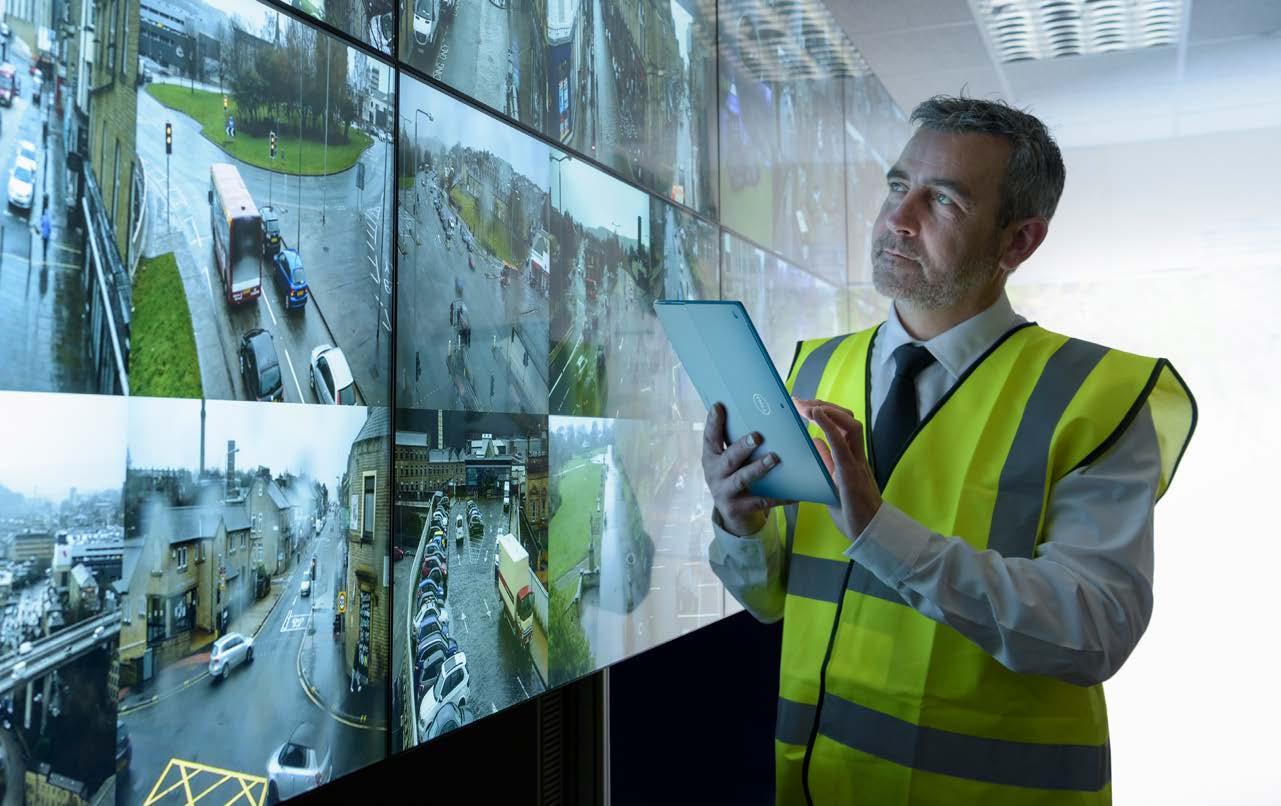
Safety and security for now and whatever’s next.
With the world’s #1 OEM Solutions Provider * a safer and more secure future is all by design. *Global Share based on 2023 Revenue, VDC Research, Worldwide OEM Solutions Provider






PIONEERING CHANGE
The Security Middle East Conference 2024 promises to be a pivotal event for security professionals across the region. Hosted at the InterContinental Hotel in Riyadh on 14th May, this ground-breaking conference is brought to you by Security Middle East magazine, the longest-established print title for the security industry in the Middle East
This May will see our second conference take place, elevating the profile of the security sector and driven by the learnings made at the inaugural event last year. We have a world-leading selection of high-profile expert speakers joining us to share their experiences, best practice and experience with our audience. In addition, panellists will be debating some of the sector’s hottest topics, identifying trends and imparting their knowledge.
Come and join us
If you’ve not yet registered to attend then there’s still enough time to secure your place. Our attendees will gain:
• Insights from world-leading experts: The conference will feature experts from across the globe who will share best practice examples, discuss innovations within security enterprises, and explore the challenges the industry faces in the Middle East. Attendees will gain valuable insights into cutting-edge security strategies and solutions.
• Debates on future market trends: As the Middle East region develops, understanding future market trends is crucial. The conference will facilitate debates on emerging technologies,
threat landscapes and evolving security paradigms. Attendees will leave with a clearer vision of the industry’s trajectory.
• Networking opportunities: The event brings together security leaders, practitioners and decision-makers. Attendees can network with peers, exchange ideas, and forge valuable connections that extend beyond the conference.
Led by our advisory board we have curated a compelling agenda addressing where the security sector is right now and where it wants to be. The topics we’ll be covering include:
• Cybersecurity: Addressing the everevolving cyber threats and strategies to safeguard critical infrastructure.
• Physical Security: Exploring innovations in access control, surveillance and perimeter protection.
• Risk Management: Navigating risk assessment, crisis management and resilience planning.
• Emerging Technologies: Discussions on AI, IoT and blockchain, and their impact on security.
• Diversity: How can we ensure the sector encourages diversity, and
what can women bring to the security landscape.
The conference aligns perfectly with Saudi Vision 2030, showcasing groundbreaking security solutions and technology never seen before on the global stage. As the country invests in giga projects, our conference contributes to the transformation of the security ecosystem.
Saudi Arabia is at the forefront of development, innovation and investment and we aim to be your trusted partner in achieving your goals and company vision.
By bringing security leaders from Saudi Arabia and the wider Middle East together, we create a platform for dialogue. Attendees can discuss the future of the security landscape, address challenges, and explore how security systems can be implemented amidst ongoing projects.
Our collaboration with Saudi Arabia’s security pioneers ensures that we paint a clearer picture of how leadership will pave the way for the next wave of security innovators and influencers globally.
The Security Middle East Conference 2024 is not just an event; it’s a catalyst for progress, knowledge sharing and industry transformation.
Powered by
National Security
Powered by SAFE –The National Security Services Company
SAFE – The
Services Company
SECURITY MIDDLE EAST | MARCH/APRIL 2024 | 17

THE TOPICS WE’LL BE DISCUSSING

PANEL DISCUSSION 2
Building resilient cities –Future-proofing the region’s giga projects
Using knowledge from security leaders working on the Kingdom’s giga projects, as well as experience from experts with vast knowledge of city planning we’ll be exploring resilient cities for the future. How can the Vision 2030 projects exceed expectations in delivering breathtaking cities that guarantee the safety and security of its people and assets?
Our expert panel will unpick the challenges surrounding resilient cities, the latest trends and how they will impact on the sector and discuss the route forwards for success.
1
Preparing security professionals for major events and increased tourism
The new wave of tourism and notable events in Saudi Arabia make it vital for the security sector to be well-prepared. They need an enhanced focus on crisis and crowd management, as well as suitable training that is aligned closely with the ethics of good hospitality.
Our panel will discuss how Saudi Arabia’s security professionals can support this push for tourism and create a safe environment for all.
 PANEL DISCUSSION
PANEL DISCUSSION
18 | SECURITY MIDDLE EAST | MARCH/APRIL 2024
Powered by SAFE –The National Security Services Company
PANEL DISCUSSION 3
How can the industry create a green and secure future?
Climate change is having an impact on every individual, country and organisation globally. How can the security industry evolve to become more socially responsible and create a more sustainable future for the next generation?
Our passionate panel experts will be sharing their knowledge and best practice ideas to ensure the security sector keeps pace with environmental trends.


PANEL DISCUSSION 5
Generative AI and managing cyber resilience against ever-evolving threats
As technologies such as generative AI continue to develop as quickly as they can be monitored, we explore the importance of maintaining cyber resilience against threats that are powered by genAI, and the sort of attacks that come with such technology, such as data poisoning.
PANEL DISCUSSION 4
Challenging the normal – Improving inclusivity, equality and diversity in security
We will explore the challenges faced in the security industry, and how empowering inclusivity within the sector will inspire the next generation of innovation to shape the future of security for the better.

SECURITY MIDDLE EAST | MARCH/APRIL 2024 | 19

SPOTLIGHT ON THE VOICES
We unveil the brilliance behind the podium at the Security Middle East Conference, offering you a front-row seat to the pioneers of security who are shaping tomorrow. More speakers will be revealed on the day

MODERATOR
Craig Ross
Associate Director – Safety and Security, Diriyah Company
Ross holds a master’s degree in terrorism and politics and has more than 25 years’ relevant experience.

PANELLIST
Ian Keller
Global Information Technology Expert
Keller has a master’s degree in information systems management and more than three decades’ experience working at prestigious multinational companies.

PANELLIST
Khalid Almedbel CISO, confidential Government
Almedbel is an expert in cybersecurity, ICT infrastructure and technology trends with 20+ years’ experience in security systems.

PANELLIST
Hayley Van Loon
CEO, Magnolia Intelligence
A seasoned security executive, Van Loon is also Deputy CEO at Crime Stoppers International and spearheads initiatives for global crime prevention.

PANELLIST
Firas Beiruti
Regional Manager, Dell Technologies
Beiruti’s expertise spans Saudi Arabia’s video surveillance, computer vision, smart cities and IoT. He has 19 years’ experience and a passion for innovation.

MODERATOR
Betania Allo
Cyber law and policy expert
Allo excels in areas including cybersecurity, data privacy, compliance and counterterrorism and previously worked at the United Nations.

PANELLIST
Trevor Sinden
Regional Director, March Networks
Sinden uses his 20+ years of experience to help organisations use video-based intelligence solutions to cut losses from theft and fraud, and speed investigations.

PANELLIST
Tawfeeq Alsadoon
Group Head of Security, Red Sea Global
Alsadoon’s 30+ years in the security sector saw him work as a Special Security Forces Officer in the Ministry of Interior. He specialises in tourism security.

PANELLIST
Fatimah Aljulaih
Head of Cybersecurity, Alula Development Company
Cybersecurity leader Aljulaih has over a decade of experience working in the GCC. Her interests include emerging tech, talent leadership and women empowerment.

PANELLIST
Dr Nasser Alamri
Cybersecurity Executive Director, Institute of Public Administration
Dr Alamri has held a wide range of leadership roles and has extensive experience in cybersecurity and digital transformation.
20 | SECURITY MIDDLE EAST | MARCH/APRIL 2024
Powered by SAFE –The National Security Services Company

ADVISORY BOARD
Turki Alshalhoub
Senior Manager of Safety and Security, Diriyah Company
Alshalhoub is a highly experienced security specialist and a retired Lieutenant Colonel of the Ministry of Interior.

ADVISORY BOARD
Nadeem Iqbal
Middle East Regional Director, International Foundation for Protection Officers (IFPO)
Iqbal is a multi-lingual change leader skilled in security risk management, loss prevention, business continuity and resilience programmes.

PANELLIST
Joe Stanley
Riyadh Council Chairman, US Overseas Security Advisory Council
Based in Riyadh, Stanley has extensive experience in security guarding, digital security, protective security and cybersecurity.


ADVISORY BOARDADVISORY BOARD
Meshal Aljohani
Security Group Supervisor, Saudi Aramco
Aljohani holds the ASIS International Triple Crown: Certified Protection Professional (CPP), Phsyical Security Professional (PSP) and Professional Certified Investigator (PCI) certifications.

ADVISORY BOARD
Dr Mohammad Alketbi
Founder, Forceis Security
Alketbi founded one of the region’s leading professional security systems integrators and also sits on the advisory board for Intersec Dubai.

PANELLIST
Andrew Long
Principal Consultant –Security Risk Management, WSP Middle East
After six years in the British Army, Long gained 15+ years’ experience in private security, corporate security and consulting for the built environment.
Sami Althowaini
Director of Security, Safety and Transportation, King Abdullah Petroleum Studies and Research Center (KAPSARC)
Althowaini served as an Officer at Royal Saudi Air Force and as a leader for flight and ground safety and security services.

ADVISORY BOARD, MODERATOR
Luke Bencie
Managing Director, Security Management International
Bencie has trained thousands of police, intelligence and military officers around the world in counterterrorism, counterintelligence and crisis management.

PANELLIST
Dr Ahmed Sakalla
Chief Operating Officer, Wafrat Al Kheer Group
Dr Sakalla has 25 years of working experience in the Middle East, Europe and CIS area with a qualification in medical and electromechanical engineering.

ADVISORY BOARD, MODERATOR
Daniel Norman
Middle East Regional Director, Information Security Forum
Norman’s role at the ISF involves helping organisations to manage current and emerging cyber threats, focused on threat intelligence and risk forecasting.

ADVISORY BOARD
Cora Lydon
Editor, Security Middle East magazine
Lydon is the Editor of Security Middle East magazine and works with the region’s leading security influencers to compile the bi-monthly publication.

PANELLIST
Konstantin Turuntcev
Managing Partner, Event Concept Consultancy
Turuntcev is bringing to the conference, 10+ years of experience in crowd management, event management and security planning and operations.

ADVISORY BOARD
Alaa Dalghan
Managing Director, Cognit DX
Dalghan is a futurist and a specialist in digital transformation and innovation strategies and IoT technology.

SPEAKER
Mohsan Tanvir
Senior Enterprise Executive, Magnet Forensics
Tanvir has more than 10 years experience in cybersecurity. He has worked with Magnet Forensics for three years, looking after GCC enterprise customers.

PANELLIST
Abdulaziz Alqahtani
Security Operations Manager, Saudi Armaco
With a bachelor’s degree in criminal justice and criminology, Alqahtani also has extensive experience in the field of industrial security.
SECURITY MIDDLE EAST | MARCH/APRIL 2024 | 21












ONE PRODUCT TWO ILLUMINATORS Outstanding Performance Combined White-Light and Infra-Red IP Enabled www.raytecled.com Scan for more info.


PANELLIST
Saeed Ba-Dugaish
Security Operations Manager, Saudi Aramco
Ba-Dugaish’s role includes responsibility for ensuring the safety and security of the company’s assets, personnel and operations using the latest tech and best practices.

PANELLIST
Uliana Barbysheva
Managing Partner, Event Concept Consultancy
Barbysheva has built and led international security teams, including successfully delivering the two most recent FIFA World Cups.

PANELLIST
Sumaiyah Alotaibi
Security Operations Manager, Saudi Aramco
Alotaibi made history with Saudi Aramco when she was appointed as the first female Dhahran 911 emergency centre chief.

PANELLIST
Mohamad Saad
KSA and Bahrain Country Manager, Genetec
Saad has over 15 years’ experience in the IT and security industry and is responsible for driving Genetec’s overall strategy within Saudi Arabia and Bahrain.

PANELLIST
Farah Ghanem
Head of Climate Change & Policy, Alpin Limited
A passionate leader in sustainability, Ghanem guides organisations in navigating the complexities of carbon reduction strategies.

SPEAKER
Fawzan Alnuaimi
Corporate Development Director, SAFE – National Security Services Company
Alnuaimi is joining the conference from SAFE – The National Security Services Company – a transformative force in the sector.

PANELLIST
Issam Shibany
Director of Pre-Sales and Business Development, MVP Tech
Shibany has spent over 15 years managing the commercial and technical designs of complex security systems for clients.

SPEAKER
Bader Alsubaey
Director for Industrial Security Operations, Saudi Aramco
Alsubaey has rich experience in community services, project and construction management and industrial security and works as the manager of Northern Area Industrial Security Operations.

MODERATOR
Muttahir Salim
Associate Security Director Middle East, Buro Happold
Salim is a security professional with more than 25 years of experience, including a decade of military service in the UK.
There’s still time to register to join us for this industry-defining event. You’ll come away having gained new skills, contacts and confidence in the sector’s trajectory for the future. Visit www.securitymiddleeastconference.com to apply for your place. You can also find out the latest updates to our conference agenda, workshop discussions and new speakers as they’re confirmed.
Powered by SAFE – The National Security Services Company Powered by SAFE –The National Security Services Company
OUR PARTNERS SECURITY MIDDLE EAST | MARCH/APRIL 2024 | 23

DEFENCE MASTERY
Play your part in building a safer, more secure future, by joining one of the workshops taking place at the Security Middle East Conference
As well as the opportunity to hear worldclass speakers, we also aim to empower our delegates with the knowledge and skills they need to successfully do their job, with two executive workshops, running at the end of the day.
In the Cognizant Security Strategy workshop, internationally-recognised consultant and author Luke Bencie will be discussing why antiquated security practices are no longer relevant in today’s highly volatile global environment. With covid-19 underlining the need to make swift decisions, it became clear that a cohesive security strategy aligned to an organisation’s goal was needed. Enter Cognizant Security Strategy (CSS), a revolutionary approach tailored to the specific demands of a post-pandemic world.
Drawing inspiration from the dynamic nature of combat missions and intelligence operations, CSS advocates for an organic approach to security strategy. This entails making decisions in realtime, attuned to the fluidity of the threat landscape and grounded in situational awareness.
The Cognizant Security Strategy for Vision 2030 is presented by Security Management International and Icon Training Company, with all attendees receiving a digital badge of completion from the University of South Florida’s Office of Corporate Training and Professional Education and Security Management International.
The Cognizant Security Strategy Certificate Programme provides the foundational security principles you need to understand how to take an active role

in protecting large-scale businesses, as well as plotting a strategic direction to ensure that the objectives of Saudi Arabia’s Vision 2030 are achieved. Participants will learn:
• How to analyse your security posture and preparedness
• To enhance your decision-making skills
• The important difference between strategic and tactical thinking
• To develop an actionable roadmap for security decision-making
• How to take a preemptive approach to prevent threats.
Our strategic partner SAFE – the National Security Services Company –will also be preparing a workshop for our delegates. A representative from the organisation will be sharing their high-level expertise, and presenting vital knowledge for security professionals. As Saudi Arabia’s leading security organisation, and with its highly successful SAFE Training Academy raising the standards across the industry, SAFE is well equipped to host our second
workshop. Keep an eye on our website for further details about what you can expect. Each workshop can host around 25 delegates and will be run over two hours at the end of the Security Middle East Conference.
Places are available on a first-come, first-served basis. If you’re interested in attending either workshop please email ryan@securitymiddleeastonline.com and confirm which workshop.
WHY ATTEND?
Attending security-focused workshops is vital in today’s global landscape. By joining one of the workshops at the Security Middle East Conference you can gain invaluable knowledge on how to tackle the latest threats and develop suitable defence mechanisms.
The workshops offer handson, expert-led experience, and the opportunity to develop your skillset. You’ll leave with a heightened awareness of security best practices, preparedness for potential threats and a certificate that will enhance your professional credibility.
24 | SECURITY MIDDLE EAST | MARCH/APRIL 2024
Powered by SAFE –The National Security Services Company
Unified critical communication solutions for any environment
Zenitel Middle East is well positioned to drive the future of intelligent critical communication solutions. Through our portfolio of IP intercoms/ Speakers & PAVA solutions, with built-in intelligence and a focus on cybersecurity, we provide organisations with superior, scalable security and flexibility.
Zenitel Middle East is the proven, preferred choice for environments requiring crystal-clear audio to ensure the protection of human life, property, assets and the management of critical activities. With interoperability at all levels, we seamlessly integrate with access control, video management and security platforms.




Hear, be heard and be understood, every time and everywhere
info.mea@zenitel.com www.zenitel.com

OUR SPONSORS
The second Security Middle East Conference can only happen thanks to the support of our sponsors. Our 2024 sponsors are global organisations who are positioned at the forefront of the security sector and are leading the way with insight and innovation. Our sponsors help us to streamline our content and ensure it will be relevant and valuable to the decision-makers who will be in the room for the conference

STRATEGIC PARTNER
SAFE – The National Security Services Company
Established in 2019 and fully owned by the Public Investment Fund (PIF), SAFE – the National Security Services Company – has been a transformative force in the security services sector, driving integrated security solutions and supporting national security initiatives. With its vision to lead the transformation of the security ecosystem, SAFE’s strategic partnership with the conference is a testament to its unwavering commitment to excellence and innovation. SAFE’s world-class expertise will bring invaluable insights into the challenges, trends and outlook for the security sector. We are delighted to have the Security Middle East Conference “powered by SAFE”. www.safesecurity.sa
Magnet Forensics
Magnet Forensics creates digital investigation tools that acquire, analyse, report and manage evidence from digital sources including mobile devices, Internet of Things (IoT) devices and cloud services. Its products are used by over 4,000 customers from both public and private sectors in more than 90 countries across the globe.
These tools help investigators fight crime, protect assets, and safeguard national security. www.magnetforensics.com
GOLD SPONSOR
Dell Technologies
Dell Technologies helps companies and organisations shape their digital future, comprehensively transform their IT and effectively protect their most important asset: their data. The company’s goal is to significantly drive digital transformation in this way and to actively promote human progress with the help of technology. It operates in 180 countries around the world and has a portfolio that includes comprehensive software and IT security and consulting. www.dell.com
GOLD SPONSOR
Genetec
Genetec is a pioneer in the physical security and public safety industry and a global provider of world-class IP license plate recognition (LPR), video surveillance and access control solutions.
It has established itself as the leader in innovative networked solutions by employing a high level of flexibility and forward-thinking principles in the development of its core technology and business solutions. www.genetec.com
DIGITAL FORENSICS PARTNER
26 | SECURITY MIDDLE EAST | MARCH/APRIL 2024
Powered by SAFE –The National Security Services Company
GOLD SPONSOR
AMNCO
As part of the Arab Company for Security and Safety Services, AMNCO Security Solutions specialises in civil security services and integrated security solutions. It is committed to applying local regulations and legislation in line with international standards to achieve the aspirations of its customers.
www.amnco.com
SILVER SPONSOR
March Networks
March Networks offers secure, cloudbased intelligent video solutions to banks and retailers in over 70 countries worldwide. Its advanced integrations empower businesses of all sizes to use video and AI analytics to enhance security, operational efficiency, profitability and customer experience.
www.marchnetworks.com

Convergint
Convergint is a global systems integrator with expertise in designing, installing and servicing electronic security, cybersecurity, fire and life safety, building automation and AV systems. The global company is expanding its reach into Saudi Arabia to meet the demand for cutting-edge technologies and smart city solutions. www.convergint.com
Icon Training Co.
Icon Training Co. offers unique training programmes, testing, inspection and educational consultation with a wide range of standards and customised training for each industry as per client expectations and requirements of the Saudi Market and aligned with Saudi Vision 2030 and Saudi Aramco IKTVA. www.icontraining.com.sa
Eagle Eye Networks
The Cloud Video Management System by Eagle Eye Networks offers an advanced and user-friendly solution for cloud video surveillance. Its flexibility is what sets it apart from its competitors. The Eagle Eye VMS seamlessly integrates with hundreds of security partners, allowing customers to easily add the solution to their existing security portfolio. www.een.com
IDCube
IDCube is a globally recognised AIdriven physical access control solution provider, with offices in the USA, UAE, India and Malaysia.
The company has an expansive network of partners and utilises modern security solutions to provide innovations in physical access solutions, and now joins the Security Middle East Conference as a sponsor.
www.idcubesystems.com
ISF
The Information Security Forum (ISF) specialises in delivering industryleading bespoke guidance and services to businesses, to allow them to navigate the challenges of the digital landscape.
It is a leading authority on information security and risk management offering research and practical tools.
www.securityforum.org
Western Digital
Long at the forefront of game-changing innovations – from the invention of the first hard drive to advancements in 3D NAND – Western Digital continues to create and inspire, embracing a bold corporate vision to push forward data storage solutions whilst sustainably growing their company.
www.westerndigital.com










Arana Security
Arana Security is a global provider of customised security solutions, specialising in delivering end-to-end services tailored to businesses’ diverse needs, and biometric solutions.
The company’s in-house development team combine extensive industry knowledge with a keen awareness of the latest advancements in security technology.
www.aranasecurity.com
SECURITY MIDDLE EAST | MARCH/APRIL 2024 | 27


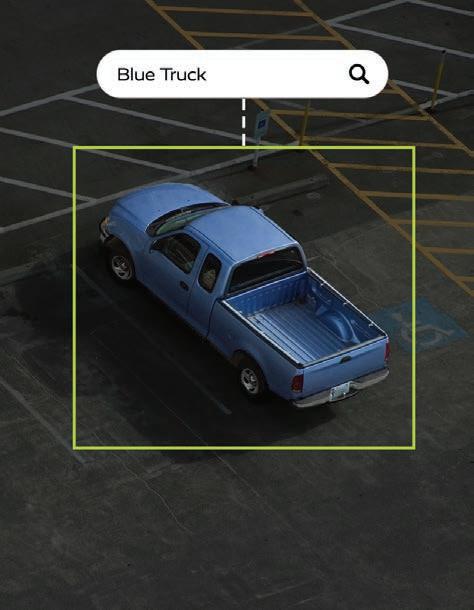
Witness the Power and Flexibility of Smart Video Surveillance and AI
Eagle Eye Networks is number one worldwide in delivering true cloud video surveillance and artificial intelligence to make businesses more efficient and the world a safer place – all on the only video management platform robust and flexible enough to power the future of video surveillance.



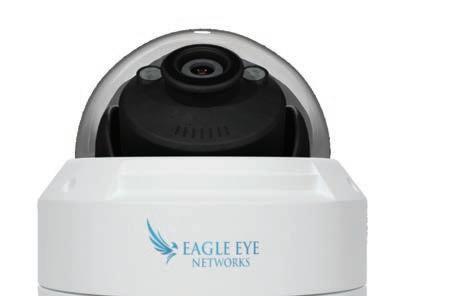
CLOUD V ID E O SURV EIL L AN CE
Open
MULTI-S IT E CENTRAL MANAGEME NT 24/7/365 CUSTO ME R SU PPORT OP EN API F OR EASY INTEGRAT IO N FLEXIBL E RETE NT ION CA ME RA FL EXIB ILITY ARTIF IC IA L INT EL LIG ENC E A ND A NA LYTICS UN IT ED STATES +1-512-473-0500 LEAR N MORE EEN.COM +52 55 8526 4926 EUROPE +31 20 26 10 460 +81-3-6868-5527 ©2024 Eagle Eye Networks. All rights reserved.
The Most Powerful, Flexible, and
Cloud Video Surveillance Platform Features:

Introducing Magnet Nexus
In today’s workplace, employees and critical business assets are often spread throughout the globe. For digital forensic professionals, their job became much more challenging when endpoints are not easily accessible and DFIR team members end up working in separate locations. But now the launch of Magnet Nexus makes large-scale investigations easier
A completely new approach was required, as legacy enterprise DFIR solutions and hardware failed to keep up with increasing demands and new technology.
That’s why Magnet Forensics is introducing Magnet Nexus – a solution for organisation-wide forensic investigations of remote endpoints, built for investigation teams in the private sector.
Magnet Nexus is a remote endpoint collection and analysis solution built to save you time and to get you forensic insights faster. As a SaaS-based solution, investigation teams can harness the power of cloud-based resources, opening a wide range of opportunities for examiners to conduct large-scale investigations with unprecedented ease and efficiency.


David Miles, President, Magnet Forensics, said: “Magnet Nexus leverages the power of the cloud to ensure that nothing stands in your way of getting to the information you need to tackle large, complex investigations and help keep your organisation safe.”
Saving time investigating multiple remote endpoints
Magnet Nexus allows digital forensic teams to collect and analyse data from multiple endpoints to help them gather information on cyberattacks, insider threats, employee misconduct, IP theft and much more.
When time is of the essence, accessing and acquiring data as quickly as possible reduces delays. Time savings are compounded when investigating several endpoints at once. With Nexus, agents can persist on every endpoint in your organisation so it’s there when you need it. Or create and deploy an agent ondemand—use both methods to meet your organisation’s requirements.

Easy to use and manage
Investigation teams are constantly juggling many tasks and deadlines, often with new cases popping up all the time. They need tools that are userfriendly and straightforward, allowing them to work efficiently while also helping new team members get up to speed quickly.
Nexus has been created with a clean UI and with minimal setup, creating a frustration-free workflow. As a SaaS solution, there are no complex or expensive maintenance or update processes required.
Dynamically scale
With cloud scalability, you can effortlessly manage increasing demands. Analyse larger datasets and tackle unexpected surges in endpoints requiring investigation, without additional investments in hardware or infrastructure. You have the flexibility to access your cases from anywhere at any time, and the ability to save time and get forensic insights faster by leveraging dynamic cloud-based processing resources.
According to Geoff MacGillivray, Chief Technology Officer, Magnet Forensics: “We know that workforces are more spread out and technology-enabled than ever before and to ensure that organisations can protect themselves, they require a solution that is dynamic and ready when they need it so they can quickly gather the data they need in the course of an investigation. Nexus helps provide that comprehensive solution.”
Secure by design
Security is a top requirement as DFIR teams begin to adopt SaaS solutions for their forensic investigations. That’s why Nexus leverages cloud infrastructure and services offered by Amazon Web Services (AWS) to deliver processing, storage, and management capabilities.
Request a free trial
Request a free trial and experience the speed and ease of Nexus firsthand.
Magnet Forensics – 1 (844) 638-7884 sales@magnetforensics.com www.magnetforensics.com
PROMOTIONAL FEATURE SECURITY MIDDLE EAST | MARCH/APRIL 2024 | 29

CONVERGENCE | IT AND PHYSICAL SECURITY 30 | SECURITY MIDDLE EAST | MARCH/APRIL 2024
Increasing synergy between IT and physical security departments


With the growing digitisation of spaces and processes, the security of resources is becoming more and more of a concern. Valerie Lapteva, Business Development Director, APAC and Eugenia Marina, Business Development Director, MENA, RecFaces explore the issue
A huge part of a company’s revenue is spent on physical and IT security to ensure the safety of assets, human resources and the business environment. Physical security protocols implemented for onground safety, incident detection, access monitoring and overall surveillance of the physical assets, are only one part of the security framework.
The IT department secures critical digital information, hardware and software resources and controls the networked assets. But most organisations fail to address the convergence of both departments, causing operational failures, and risk of physical and monetary loss with long-term productivity consequences. A robust infrastructure for physical and information security is essential for the operation of any business, manufacturing facilities in particular. Are these departments connected, though? Can you have one and not the other? Does this convergence benefit business efficiency?
Physical security for business resilience
A physical security contingent essentially protects the physical assets, workforce and business premises. It includes:
• monitoring access points;
• tracking and responding to security threats;
• video surveillance of the site;
• on-ground patrolling and checks.
Security breaches are a huge roadblock to any organisation’s growth. Physical security incidents cost firms more than $1 trillion of revenue in 2022, according to the World Security Report 2023. Physical assets in heavy manufacturing industries are highly vulnerable to both internal and external security threats like unauthorised access to critical assets, thefts and break-ins. Not only this, such threats can create a sense of insecurity among the workforce and may lead to employee agitation, strikes and unrest.

The physical security department operates day and night to identify and tackle possible security issues and address the weak points. As technology advances, the Internet of Things (IoT) enables connecting physical assets on a digital network. This is where the IT and information security department comes into play.
Enhancing workplace safety through IT security IT and information security revolves around the protection of sensitive business data, access to principal equipment, as well as the prevention of human errors and malware attacks. Going beyond this, it is crucial to identify security vulnerabilities, detect incidents and take corrective measures to mitigate physical and monetary losses.
Misuse of company resources or data is one of the most common security breaches that increase the risks inherent in industrial operations.
CONVERGENCE | IT AND PHYSICAL SECURITY
SECURITY MIDDLE EAST | MARCH/APRIL 2024 | 31
“A robust infrastructure for physical and information security is essential for the operation of any business, manufacturing facilities in particular”

The IT department uses smart solutions, like firewalls, factor authentications, multi-modal security techniques and anti-malware software, to tackle such adversities. However, the challenges posed by the increasing footprint of physical resources on virtual networks require a more agile approach to safeguard critical assets.
Addressing the operational gaps
Regular technological advancements and digital transformation have compelled businesses to rethink their security infrastructure and the way they work. Imagine entering an office for the first time. From physical security protocols to automated access management, it is becoming harder and harder to separate the functions of physical security and IT security departments.
• Invasion of assets: Smart office environments are equipped with IP-enabled machines and operate on integrated networks. Access to critical data and business information can be gained through the invasion of physical assets, like server rooms and restricted areas.
• Restricted biometric security access: Attacks on video surveillance systems, and camera injections are common in thefts of physical and digital assets. Not only this, biometric access system breaches through tailgating and identity theft to gain access to restricted areas can lead to significant loss of property and information.
• Vulnerability to risks: According to the World Security Report 2023, 90% of CSOs find information technology threats, that threaten physical security systems, challenging to operations. Security risks, directly or indirectly, make the business vulnerable to monetary risks, human risks,
reputational risks, operational risks and financial risks.
• A blow to operational efficiency: The inevitable interdependence of physical security and IT departments divert the root cause of security incidents. Such inconsistencies disrupt the operational flow and productivity in business units as employees start to lack trust in security. Consequently, industry competitors thrive on such weaknesses, damaging the business reputation and potential poaching of resources.
To ensure the safety of assets, workforce and environment, integration of physical security and IT departments becomes imperative.
Unification for a robust security structure
In industries like healthcare and manufacturing, the productivity of the workforce allies with their safety. So, physical and IT security is pivotal to prevent losses from security slips and data leaks. Integration of their processes helps elevate security posture and mitigate costs of inefficiency.
Convergence of both the departments
The starting point for a unified infrastructure is the convergence of physical and IT security departments for shared responsibilities of overall security. CISO and PFSO need to work together for threat detection and tackling the loopholes to prevent any detrimental impacts on overall functional efficiency.
Threat detection and response protocol
Build a powerful threat detection and response protocol by integrating the capabilities of the physical and IT
security systems. Incident response can make or break a security system. So, measuring and monitoring possible risks, and devising a strong response plan and recovery programme are key to strengthening the overall security.
Safeguarding physical and digital boundaries
An efficient security system works as a digital fence and sends immediate alerts of security threats. Invest in security and biometric solutions that can be easily integrated in the video surveillance system, help automate access control, detect security infringements and accelerate raising alerts.
Rethink risk assessment and security metrics
Essentially, the risk assessment tasks are not to be separated for physical or IT security processes. It is important to reevaluate how various security risks are assessed in a way to measure their impact on operations. Nevertheless, security metrics and risk mitigation are important to keep safe from incidental costs.
Embarking upon modern security
Organisations cannot afford to incur losses from inefficient security setups. With technology levering the digital presence of physical assets, physical and IT security departments need to work together for elevated productivity. Convergence of both is pivotal for cost savings, safety and hazardous incident prevention, business scaling, infrastructure enhancements and systematic growth. www.recfaces.com
CONVERGENCE | IT AND PHYSICAL SECURITY
32 | SECURITY MIDDLE EAST | MARCH/APRIL 2024
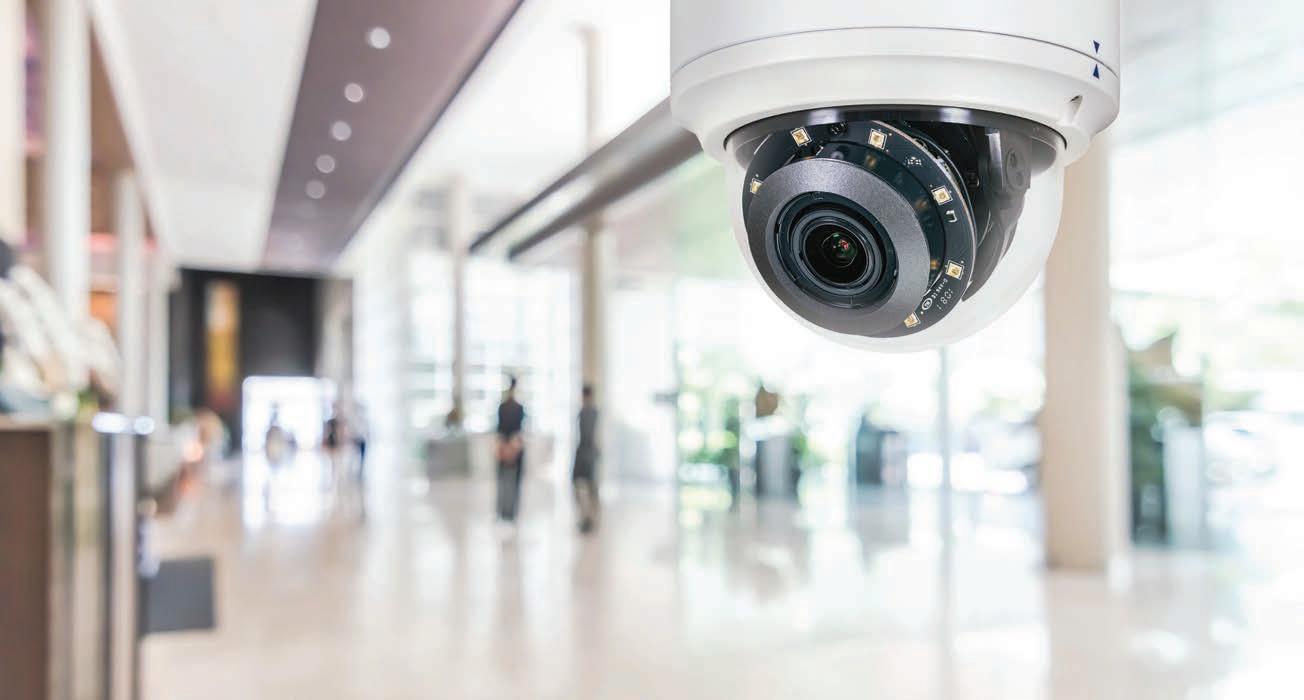
The future of intelligent video solutions
With practical and innovative solutions that adapt to fit any current and future needs, March Networks® IP video surveillance and data analytics help organizations of every size enhance their security — and their competitive advantage.
Our comprehensive Cloud Suite of intelligent video solutions delivers operational efficiencies, business intelligence, streamlined sharing and enhanced customer service capabilities.
A trusted leader in banking and retail
Protect your business with a solution that gives you real-time visibility into your stores and branches without the hassle of maintaining your own surveillance network. We help retailers and banks cut losses from theft, oversee operations, improve service, and drive profitability with video-based business intelligence.
BANKING

One of Türkiye’s leading banks, Garanti BBVA is transitioning to an all-digital video surveillance platform including over 22,000 IP cameras and 5,000 Network Video Recorders, all managed seamlessly and centrally using March Networks enterprise-grade video management software. It provides advanced system-wide monitoring for real-time visibility, and offsite backup storage.
RETAIL
eXtra, the largest electronic retail and home appliance store in Saudi Arabia, opted for March Networks due to its high security standards and reliable products. They are implementing March Networks' NVRs and cameras, aiming for easy deployment and management using Command Enterprise for centralized control and health reporting. Once their initial stores are deployed with March Networks systems, eXtra plans to explore March Networks Searchlight for Retail, for business intelligence and operational advantages.
Qatari Banking
March Networks have dominated the Qatari Bank sector since 2011, powering 3 of the top 4 banks, including the largest bank in Qatar which is also regarded as the largest, by asset, in the Middle East. Over and above our end-to-end video solutions, the banks also use our Searchlight for Banking solution to flag suspicious ATM transactions and to speed up investigations.
The island-inspired clothing and home furnishing retailer selected March Networks’ comprehensive retail solution to gain faster, more robust loss prevention capabilities, improve recovery and apprehension rates with higher-quality video evidence, and better safeguard customers and employees at its stores worldwide. It has reduced investigation times by over 90 percent.
See why March Networks is trusted by over 1000 financial institutions and over 300 retailers worldwide.
marchnetworks.com
Empowering Change

Across the Middle East a quiet revolution is unfolding – and it’s changing the security landscape, quietly, confidently and ever so effectively. For decades, the security sector has been a maledominated fortress, guarded by tradition, bias and entrenched ideas. But more women than ever are stepping forward and joining the ranks of security professionals, not merely as observers but as architects of security itself.
Many women simply seek parity with their male counterparts, to receive acknowledgment based on merit, not gender. These women are not gender warriors; they are professionals navigating a landscape where the odds can be stacked against them.
Fortunately, the security industry, like technology, is evolving. Roles are diversifying and the balance is shifting. Companies championing gender diversity reap the benefits — innovation, resilience, and fresh perspectives. Women, emboldened by their predecessors, are breaking down external and internal barriers. Their presence elevates concerns and priorities, ensuring that the best minds — regardless of gender — are given opportunities to safeguard our world.
So, here we celebrate the women who stand at the intersection of courage and strategy, weaving a new narrative for the sector — one where security knows no gender, only excellence.
 Egle Zemeckaite
International Incident Management & Travel Security Advisor, Securitas
Egle Zemeckaite
International Incident Management & Travel Security Advisor, Securitas
“Having recently relocated from Europe to the UAE, I initially harbored some apprehension about integrating into the local work environment. However, my concerns were swiftly dispelled upon my arrival. I was warmly greeted with smiles and a level of respect that exceeded my expectations at the office, networking events and conferences. It was heartening to observe individuals genuinely investing time and effort to acquaint themselves with me and my
“I feel empowered to voice my opinions and ideas”
professional role, with an eye towards potential collaborations.
“Within my organisation and immediate team, I have been pleasantly gratified by the recognition and value attributed to my contributions. I feel empowered to voice my opinions and ideas, fostering a sense of appreciation for my work. Furthermore, I find inspiration in the exemplary leadership demonstrated by our country’s president, who not only excels in her role but also serves as a beacon of empowerment as a female leader.”
DIVERSITY | WOMEN IN SECURITY
34 | SECURITY MIDDLE EAST | MARCH/APRIL 2024
Amani Al Balawi
Jeddah Al-Balad Project
“As a minority in this male-dominated field, I have had to prove myself time and time again to gain the respect and recognition of my colleagues. However, I have also found that my unique perspective and skills as a woman have allowed me to bring a different approach to problem-solving and decision-making in the security industry. Despite facing stereotypes and biases, I have persevered and continued to excel in my role, breaking barriers and paving the way for other women to follow in my footsteps.”
 Haneen Aldakheel Security System Engineer, Naizak Global Engineering Systems
Haneen Aldakheel Security System Engineer, Naizak Global Engineering Systems
“Stepping into the field of security in 2020 wasn’t initially in my plan, but as I dug in deeper, I realised its impact on everything around us, including the economy, people’s safety, and the list goes on. In 2023, my journey took a thrilling turn with my first project in the desert, overseeing security at an oil and gas facility. Driving solo for 162 km safely on my last visit, I was amazed at the detailed security processes in place. It was cool to implement these protocols and software hands-on even though it was challenging but I still enjoyed it.
“To my fellow women: seize this opportunity! While I initially stood alone, I now stand proudly alongside Shaima Alshaibi and Norah Almokhaitah. Let’s fill the ranks and rewrite the narrative. Dive into HCIS directives, it’s our bible as my manager calls it. Consider certifications like PSP, APP, CPP, and PCI—they’re keys to unlocking new horizons.
How can we encourage more women into the sector?
According to Betania Allo, cyber lawyer and policy expert, there are several steps that can help address the lack of diversity in the security workforce:
Inclusive hiring practices: This involves actively seeking out female talent through diverse interview panels, targeted outreach programmes, and employing unbiased evaluation processes that go beyond traditional benchmarks. By prioritising merit and fostering a welcoming atmosphere, the industry can attract a broader range of highly skilled individuals.
Mentorship programmes: Pairing aspiring female professionals with experienced mentors provides invaluable guidance and support. We can also showcase the amazing achievements of women leaders, demonstrating the fulfilling career paths available within the sector. This not only empowers women but also breaks down stereotypes and paves the way for future generations. Representation truly matters. In my career, it would have saved me a lot of time!
Collaboration with educational institutes: By introducing security fields to young women and girls at a crucial stage, the industry can spark their interest and equip them with the necessary skills to pursue careers even from an interdisciplinary perspective. This proactive approach ensures a robust talent pipeline for the future.
Cultivating a safe and inclusive work environment: This requires establishing clear policies against discrimination and harassment, fostering a culture of respect where all voices are heard, and ensuring a space where women feel valued and empowered to contribute their unique perspectives. By creating a work environment free from bias, the industry can unlock the full potential of its diverse workforce and drive innovation forward.
“To every woman fighting for her dreams: you’re not alone. Together, we’re unstoppable. Keep blazing those trails!”
Samar Al Balawi Dispatcher Supervisor, AlUla
“Saudi women, both historically and presently, have consistently embodied a sense of empowerment in all aspects, as emphasised by Vision 2030 for the Kingdom. While there have been numerous positive transformations, it remains plausible that women face

additional pressure to validate their capabilities and encounter unique obstacles, particularly in emerging domains. Although women were initially expected to conform to societal norms, it is precisely this adversity that has fortified my resolve to confront challenges head-on and demonstrate my worth. Overall, my experience as a woman in security in the Gulf has been a journey of growth, resilience and empowerment, and I am proud to be a part of a changing landscape where diversity and inclusion are becoming increasingly valued and recognised.”
DIVERSITY | WOMEN IN SECURITY
SECURITY MIDDLE EAST | MARCH/APRIL 2024 | 35
 Hessa Almatrooshi Director of IT – Acting, Ajman Free Zone
Hessa Almatrooshi Director of IT – Acting, Ajman Free Zone
“As an Emirati woman working in security in a field predominantly occupied by non-Arabic speakers, mostly men, my positive experience lies in breaking barriers and proving that women can excel in traditionally male-dominated fields. Challenging myself and proving the empowerment of women has been rewarding.
“My advice to women seeking to enter the security sector in the Middle East is to be confident, persistent, and

continually educate themselves in the field. Networking with other women in the industry and seeking mentorship can also provide invaluable support and guidance.”
 Betania Allo Cyber lawyer and policy expert
Betania Allo Cyber lawyer and policy expert
“Diversity is essential for driving innovation and progress in cybersecurity. When we have a diverse range of perspectives, we are better able to
identify and address the complex challenges we face. Diversity also fosters creativity and innovation, leading to the development of new and innovative solutions. Additionally, diversity helps us to better understand and protect our diverse digital world. Embracing diversity, especially gender diversity, isn’t just a buzzword; it’s a strategic move that can significantly enhance various aspects of any organisation: public or private sector, academia, or civil society.
“The industry thrives on constant evolution and groundbreaking ideas as technology advances. To achieve this, fostering a diverse and inclusive environment where everyone feels empowered to contribute is crucial. Bridging the gender gap requires a multifaceted approach.
“Men, particularly those in leadership positions, have a crucial role to play in empowering women in security. For example, actively amplifying their

DIVERSITY | WOMEN IN SECURITY 36 | SECURITY MIDDLE EAST | MARCH/APRIL 2024

voices is key. This involves sharing their work, promoting their achievements, and advocating against any form of discrimination or bias. Encouraging female participation in conferences, workshops and leadership roles within professional organisations to further elevate their visibility.
“Finally, fostering a more inclusive environment requires conscious effort. Men, especially those in managerial positions, can become strong advocates for women in security, fostering a more equitable and thriving industry for all.”
See more of Betania in action at the Security Middle East Conference
 Amal Saud Aldajani General Supervisor, SAFE – National Security Services Company
Amal Saud Aldajani General Supervisor, SAFE – National Security Services Company
“The increasing demand for women in security reflects their dedication and ability to maintain high standards of performance. Women have demonstrated their capability to succeed in this field, overcoming obstacles and achieving remarkable success while working alongside their peers. Promoting the inclusion of women in the security sector is crucial for achieving gender equality and enhancing overall security measures. By actively encouraging and supporting women to pursue careers in security, we can benefit from diverse perspectives, skills, and experiences that can contribute to more effective and comprehensive security strategies.”
 Dana Haubold CISO External Help AG, an e& enterprise company
Dana Haubold CISO External Help AG, an e& enterprise company
“As a woman in security in the UAE, I feel proud to work in the industry that I love and feel very valued amongst my colleagues and industry peers, the majority of which are certainly men.
“As the corporate security profession has matured into a business risk function and the pressure on the corporate security posture is ever increasing, we require innovative, creative and analytical business decisions. Security is ultimately a people issue and must be embedded into critical business functions so that our colleagues and senior management work with security in mind to ensure secure operations.
“With this in mind there is a clear chance to recruit more women into security as we benefit from more diverse talent entering the sector. This includes, for example, professionals with a general business, risk and resilience background who are strong business mediators and who can work well with different types of people, understand their behaviours, business needs and challenges, to be able to build a successful security capability within corporate strategies and processes.
“By enabling diversity in hiring, creating an inclusive culture, offering training and development opportunities, encouraging collaboration, and embracing diverse approaches to addressing security risk, corporate security leaders can create high performing security teams that deliver successful outcomes to the business.”
“Championing women in security promotes diversity, enhances innovation, and strengthens the industry”
 Hayley Van Loon CEO, Magnolia Intelligence
Hayley Van Loon CEO, Magnolia Intelligence
“Championing women in security promotes diversity, enhances innovation, and strengthens the industry by tapping into a broader talent pool. Diverse perspectives lead to more effective problemsolving and resilient security measures.
“To advance diversity, equality and inclusivity, the sector should prioritise opening doors to individuals with diverse work backgrounds, while launching comprehensive transition programmes offering training and mentorship. Valuing a spectrum of skills, including tech proficiency, communication and problemsolving, is crucial. By embodying these strategies, we cultivate a robust security community, uniting individuals with expertise from various sectors in our shared mission to create a safer world.”
See more of Hayley in action at the Security Middle East Conference
The Middle East has the lowest level of gender parity in workplace participation globally
DIVERSITY | WOMEN IN SECURITY SECURITY MIDDLE EAST | MARCH/APRIL 2024 | 37
30%

VIDEO SURVEILLANCE | AR 38 | SECURITY MIDDLE EAST | MARCH/APRIL 2024
How can augmented reality and video surveillance work together?


Much progress has been made in integrating augmented reality applications with video surveillance. Stefan Lundberg, Senior Expert Engineer at Axis Communications, asks, what can we expect next?
What began with daydreaming, quickly progressed to innovation, and has now reached the point of bringing certain ‘what if?’ scenarios to life. We are starting to see industries experience the benefits of integrating augmented reality (AR) with their video surveillance.
With more use cases opening up as further AR applications come to market, now is a great time to look at the progress made so far, as well as the future potential as we move closer to our vision of creating “a smarter, safer world”.
AR Vs VR
Before we dive in, it’s worth clarifying what we’re referring to when discussing AR technology. In broad terms AR can be defined as the ability to overlay text, images and other information onto a live scene or video to provide additional insight to the user. This information can be displayed on whatever device is used to view the live scene, such as monitors
and mobile devices, and in some applications through smart glasses and headsets.
It’s worth contrasting this with virtual reality (VR) as they can sometimes be confused. VR — most commonly through a headset — provides a firstperson perspective of being in an environment or situation the wearer isn’t actually physically in.
VR is the illusion of being in a particular environment; AR is actually being somewhere or viewing an actual scene, with additional information overlaid.
A simple example of AR in the consumer environment would be an individual walking down a street in an unfamiliar town, seeing the environment live, but with useful information overlaid on what they’re seeing through ARenabled glasses or on a mobile device. This information might be directions to a meeting location, or local places
VIDEO SURVEILLANCE | AR
SECURITY MIDDLE EAST | MARCH/APRIL 2024 | 39
“AR can effectively be an ‘insight superpower’”

of interest. The individual might issue a voice command, “show me the toprated restaurants on this street” with the AR immediately altering the overlaid information in response.
AR can effectively be an ‘insight superpower’, adding valuable information to what someone’s actually seeing, hearing, touching… even smelling and tasting, without having to use their hands to access it.
When thought about in this way, our imaginations can run wild.
AR in video surveillance today
Modern network video surveillance cameras provide extremely high-quality images to operators which in themselves deliver significant value. Live views of a scene in forensic levels of detail allow operators to monitor and assess situations, and respond in real-time to incidents and activity, alerting first responders when relevant.
In situations when operators are then directing first responders on the ground, there are clear benefits to having additional information overlaid on the scene. Some Axis cameras include an orientation aid, which can overlay street names and compass points to live video footage to assist in providing accurate directions.
But when seconds can make a real difference, many other useful pieces of information can be delivered through AR overlay. Understanding the location of the closest defibrillator, for instance, and being able to direct people at the scene via live audio could be a life-saving enhancement.
Helping first responders with the layouts of building, entrances and emergency exits, whether remotely from
the operations room or locally via mobile devices, can hasten building evacuation or finding people trapped inside. Safely dispersing crowds from areas through the most effective routes can reduce the risk of incident escalation — again, this can be managed remotely from the control room with information overlaid on live video monitors, or locally when delivered on mobile devices.
Opening up new use cases
When it comes to integrating AR alongside video surveillance, the leaps and bounds of progress to-date have enabled brand new use cases.
For instance, live footage is already bringing vital insights to emergency services, such as firefighters, in some regions. While on route to a fire, PTZ video surveillance on board the fire truck can be constantly pointed towards the fire, streaming live footage to the firefighters as they prepare.
Looking ahead, there is the potential for a police officer to view video with information overlaid using data aggregated from sensors such as installed surveillance cameras, body worn cameras, and even cell phone location data. Text could be overlaid on the video to direct the officer to the location of a cell phone that was used to initiate a call to emergency services requesting assistance, speeding up a search for someone in distress. It is also not beyond the realms of imagination to think that medical staff and paramedics could use AR to help provide assistance and support to people at the scene of an accident, or that live feed of surveillance from the scene would assist them with relevant preparations while on route.
Beyond emergency services
The use cases above provide some of the most compelling scenarios in which AR could have a significant positive impact on public safety, but examples in other sectors are also coming to light.
For example, personnel in an industrial plant can receive data from connected sensors throughout the site — video surveillance, but also temperature, air quality sensors and smoke detectors as examples — which can allow them to react to issues more rapidly, while also having a clear and live view of the scene.
Going beyond this, alerts related to sudden increases in temperature, breaches of perimeters, specific noises (such as raised voices) could bring live images to video monitors, while mapping directions of the fastest route to the scene, or to locations of fire extinguishers and alarms. In the case of a break-in, video surveillance cameras tracking the intruder might even leave a trail of ‘breadcrumbs’ overlaid on video surveillance for security officers to follow.
The potential applications are endless.
AR and video surveillance –sooner rather than later?
Many companies are already tapping into the benefits of AR in their surveillance systems. From manufacturing to retail to city-wide surveillance, AR technology is enriching existing video streams in a variety of ways — with more use cases constantly opening up.
Technologically, there’s very little — if anything — to stop the continued development of solutions such as those detailed above. Only our imagination can limit the potential of this technology to create a smarter, safer world. www.axis.com
VIDEO SURVEILLANCE | AR
40 | SECURITY MIDDLE EAST | MARCH/APRIL 2024

With over 40 years of expertise, AMNCO is a trusted provider of Security Solutions, cash solutions, and facility management services in Saudi Arabia. Renowned for its pioneering services in security and money transfersectors, AMNCO offers comprehensive security consultations, risk assessments, and tailored solutions. ensuring the highest levels of security for facilities, employees, and customers across the Kingdom.

Mission Vision
To be a company whose primary goal is the customer by providing security services that are safe, available, innovative, and designed according to the customer’s needs.
Providing wide-ranging security solutions and applying the highest standards, relying on experienced people supported by our achievements.
920007030 info@amnco.com.sa
8862 Al Arz - Al Olaya Dist. Unit No 1986, Riyadh 12611 - 2400, Kingdom of Saudi Arabia. www.amnco.com

Values Competence Co-operation Responsibility Integrity Innovation

Preventive Maintenance for Critical Infrastructure: The Key to Ensuring CI Performance and Resilience
How AI-powered surveillance facilitates preventive maintenance to maximize the performance, reliability, and resilience of critical infrastructure
The utilities sector is the backbone of the modern economy. By providing essential public services like electricity, clean water, and gas, utilities organizations help to improve the quality of human life and also spur a nation’s social and economic growth.
It’s a fact that in every country, utilities are considered critical infrastructure. It’s also a fact that any breakdowns or disruptions in this infrastructure can have catastrophic consequences on that country. To avoid these consequences, it’s vital to safeguard utilities systems from the threats, vulnerabilities, and day-to-day wear-and-tear that may adversely affect their operations and performance. And this starts with preventive maintenance.
Preventive Maintenance: Critical for Critical Infrastructure
Preventive maintenance is a proactive strategy to prevent future breakdowns and malfunctions in utilities equipment and systems. Ongoing preventive maintenance enables utilities organizations to identify and address vulnerabilities in their assets before they can lead to costly breakdowns or failures.
Through proactive inspections, upgrades, cleaning, or replacements, they can optimize asset operations and performance, maintain mission-critical communication networks and control systems, and reduce the need for costly reactive repairs.
Maximizing equipment uptime boosts its productivity, reliability, and stability. Less downtime also translates to longer asset lifecycles, lower total cost of ownership (TCO), and a higher return on investment (ROI).
Preventive maintenance activities can also highlight safety issues, enabling utilities decision-makers to take steps to enhance worker safety. Also, by reducing the probability of accidents and injuries, they can avoid costly legal liabilities and consistently comply with various health and safety regulations.
Effective Preventive Maintenance of CI with AI-powered Surveillance
Continuous surveillance is the foundation of preventive maintenance in utilities settings. A robust surveillance system with high-resolution and ruggedly-designed cameras provides 24x7 monitoring of the entire facility and its assets. It provides continued and detailed visibility that can help floor managers and maintenance personnel to proactively identify the machinery or equipment that require repairs or updates to prevent breakdowns. A unified system of connected cameras, video recorders, sensors, alarms, and monitoring stations enable personnel to schedule regular inspections, cleaning tasks, or repairs to ensure regular equipment upkeep and prevent disruptive or costly failures.
AI-powered surveillance systems enable utilities to go even further than preventive maintenance - to predictive maintenance. These advanced systems with integrated analytics capabilities keep track of utilities equipment during normal operations. They also continuously analyze equipment conditions to identify abnormal deviations and accordingly, propose accurate and timely maintenance recommendations that help reduce the probability of failures.
Since these recommendations are based on assessments of actual conditions, maintenance personnel only need to work on the machinery that actually requires maintenance. This prevents unnecessary work, minimizes planned downtime, and also helps the organization to save money on spare parts and supplies.
Implementing Preventive Maintenance with a Skilled Technology Partner
MVP Tech – Convergint ME empowers utilities organizations to maximize the value of regular preventive (and predictive) maintenance. We engineer, build, and customize integrated surveillance solutions that provide the comprehensive security and visibility utilities providers need to detect and fix defects before equipment can break down. Moreover, the system’s findings and analytics are continuously optimized to provide system updates and improvements.

 Contact Our Experts
Contact Our Experts
Unlocking the business value of security


How
can security professionals demonstrate and realise the value of security more clearly and without conflict from other business stakeholders, asks Daniel Norman, Middle East Regional Director, Information Security Forum
Security functions, and especially cyber security teams, are some of the most scrutinised departments within any enterprise. These teams have to deal with a highly dynamic threat landscape and are responsible for securing and enabling the business – however, limited budgets and poor perception of the value proposition these teams bring can create a challenging working environment.
Remaining relevant, providing business value and demonstrating success are all key challenges that security leaders must work to overcome.
This is how organisations can reposition the proposition:
1 | Showcase the relevance of security in the modern business value chain
Historical models for business value chains break down lists of business activities into two categories:
Primary activities, those credited with the potential to create value for a business such as logistics, marketing, and sales.
Secondary or support activities, those that help or enable employees or organisations to create value.
Security and risk management activities are notable by their absence in these historic models, and whilst
the presence – and value – of such activities is understood by security and risk practitioners, others will not fully recognise them. There is a strong case for its inclusion in modern business value chains, and this can form the basis of a useful conversation with business stakeholders. By exploring how security has evolved from its heritage as largely a set of technical controls to encompassing people, process, and technology, it is possible to demonstrate that security exists in some form in nearly all primary and support activities, positively affecting value outcomes in many ways.
2 | Encourage collaboration to balance the cost, risk, agility and security equation
As security leaders negotiate what controls should be added, altered or removed, it is important to outline the business, technical and risk-based benefits in equal measure, supporting a value-based decision-making process. Balancing the four variables of cost, risk, agility and security control requires an effective stakeholder engagement and eloquent value proposition.
There can be circumstances where individual considerations can provide useful support to the broader decisionmaking process when adding, altering or removing security controls:
Legal and regulatory: where cost control places tight constraints on security and risk management investments, such frameworks can serve as a useful baseline of control requirements – things that must be done – and can serve to keep conversations more grounded when determining what to stop, start and continue.
Agility: it can be argued that investments and enhancements to security controls can, in some cases, support the case for agility and drive it upwards rather than increase friction. Automation is a good example of this. Cost: process refinements and enhancements to security controls can optimise run costs in the longer term.
3 | Improve the relationship with the business
Whilst balancing the cost, agility and risk equation will be the main consideration, there are stakeholder management aspects to consider both within the boardroom and the wider business teams. For example, the language of risk can be more understandable to the business than the language of security because risk is all about the business and generally understood as a concept by most. The conversation can shift to security language when the stakeholder is ready,
BUSINESS STRATEGY | SECURITY VALUE 44 | SECURITY MIDDLE EAST | MARCH/APRIL 2024
rather than it being a forced conversation. For example, using business-aligned terminology and demonstrating the impact of not acting can be profoundly helpful, e.g. “if we don’t act, a ransomware incident will shut down the manufacturing plant, our product stockpiles will diminish and within 48 hours we will be unable to meet customer demand, which will impact our share price and cash flow.”
Moreover, it is important to remember that, fundamentally and inevitably, security adds friction by design. If access cards didn’t have to be used to enter an office or credentials used to log into a workstation, employees would be able to access data more quickly – but so would everybody else. The security team should always ensure there is a clear and concise explanation as to why any change is being proposed in the first place, and that business stakeholders are given opportunity to ask questions and receive satisfactory answers. Any risk remediation activity should be orchestrated through effective business change management: how this change will be communicated, what the marketing pitch is, and how it can be sold to the business as a friction that creates or protects value.
4 | Develop a fresh, innovative and positive brand and culture for security
The value and relevancy of security can be enhanced by the formation of a culture that encourages positivity. The objective should be to replace the historic perceptions of a stifled, bureaucracy-heavy security culture with one that encourages a fresh and more creative relationship with the business to flourish. It is incumbent upon the security leader to set the right tone to enable such a culture to develop.
Culture is anchored in unspoken behaviours and mindsets but is defined by norms and expectations that must be clearly defined, collectively owned and universally practised in order to be fully effective. To build an effective leadership strategy that changes the security team’s culture, the prevailing culture and context of the organisation itself must first be understood. It is important to recognise that the context of the organisation, for example any regional cultural differences, the industry sector, and the underlying company structure, can all be enabling and limiting factors in any planned change to team culture and behaviours. This appreciation can help the leader to understand the intended and unintended

effects of the underlying organisational culture to their own ambitions, and this knowledge will help understand how best to approach the team’s own cultural transformation.
To support the security culture and brand journey, security leaders must: Understand the business itself and how security can support the overall mission.
Become a strong negotiator, by balancing risk and reward in business context.
Hone soft skills by becoming approachable and honest – you want the business to come to you and consider the security implications. Offer real tangible solutions, not just identifying problems or risks.
Security leaders must inherently and continuously demonstrate the value they and their team bring to the enterprise. However this must be done without overwhelming the audience with technical jargon and overusing fear mongering, creating uncertainty or doubt. Providing a direct link between business value and the impact of the security function will ensure the department and the work the team does remains relevant and impactful.
BUSINESS STRATEGY | SECURITY VALUE SECURITY MIDDLE EAST | MARCH/APRIL 2024 | 45
CASE STUDY
Aston Martin Aramco Formula One team
Find out how SentinelOne has positioned itself at the heart of the Aston Martin Aramco Formula One team for safety and security measures in the cyber realm

COMPANY OVERVIEW
In 2021 the Aston Martin Aramco Formula One Team made its return to Formula One, with SentinelOne as its Official Cybersecurity Partner. More recently, it has extended the collaboration with a multi-year agreement, which will see Aston Martin Aramco leverage the SentinelOne Singularity Platform to keep its operations secure in an ever-evolving threat landscape. During the summer of 2023, Aston Martin Aramco opened its new AMR Technology Campus, helping the team’s environmental ambition with better insulation, intelligent use of natural light and solar panels helping power the site. SentinelOne has been crucial in supporting Aston Martin Aramco’s digital transformation ambitions.
THE CHALLENGES
One of the key focuses for Aston Martin Aramco is adopting artificial intelligence threat hunting into its Security Architecture. By doing so it hopes to accelerate advances in its security capabilities and drive improved operational performance. The Aston Martin Aramco team handles huge
amounts of data across a sprawling and complex infrastructure and in order to stay competitive all of the data must be fully secured. Clare Lansley, Chief Information Officer, Aston Martin Aramco Formula One Team, explained: “I think the main challenge is the global nature of our business and the number of temporary
remote operations. We travel to 24 venues around the world and have to quickly set up IT infrastructure. That presents different challenges because we are connecting across global networks with multiple users. Protecting data is a major priority because data is our bread and butter, which helps make the car go faster.
CASE STUDY | SENTINELONE 46 | SECURITY MIDDLE EAST | MARCH/APRIL 2024
“SentinelOne has been a great partner, and we are thrilled to be extending our relationship. Cybercriminals today move fast, and with SentinelOne as our Official Cybersecurity Partner, we can move faster to protect ourselves against threats. SentinelOne provides Aston Martin Aramco with a powerful platform that is a game-changer, as our team push the limits of performance, knowing that they are protected by the most advanced solutions”
Clare Lansley, Chief Information Officer, Aston Martin Aramco Formula One Team
And we are dealing with huge amounts of data each time the car runs.”
The partnership with SentinelOne is helping Aston Martin Aramco to focus on its key objectives, especially as it prepares to launch two new buildings on its technology campus over the next 12 months.
THE SOLUTIONS
SentinelOne was fundamental in delivering the secure environment required by the Aston Martin Aramco Formula One team. The team is focusing its efforts to improve its cybersecurity by delivering a new Security Architecture to ensure it is protected from modern cyber threats, supporting new working practices and ensuring all resources and data are highly protected. SentinelOne plays a key part of this architecture, helping the team to achieve new levels of security and threat visibility.
As with many organisations, Aston Martin Aramco manages a huge amount of data across a very complex network, and the team needed to gain a unified view of this data and put it into context, to ensure they can drive informed actions and keep their environments safe. SentinelOne’s Singularity ingests data from security solutions across the entire enterprise, consolidates it into a single data lake, augments it with the power of AI and provides context that allows the Aston Martin Saudi Aramco security team to see the big picture in real-time and defend against attacks at the machine speed with which they are executed.


CASE STUDY | SENTINELONE
SECURITY MIDDLE EAST | MARCH/APRIL 2024 | 47

Why IoT matters in physical security

Firas Jadalla, Regional Director META, Genetec, shares best practices on how to bring all of your organisation’s IoT/IIoT data together to generate meaningful outcomes and big gains while mitigating cybersecurity risk
PHYSICAL SECURITY | IOT
48 | SECURITY MIDDLE EAST | MARCH/APRIL 2024

A 2023 Statista report projects that by 2030 there will be 30 billion Internet of Things (IoT) devices in use. That’s three times as many as there were in 2020. The numbers continue to grow because connecting sensors and systems, especially across a business, promises big efficiency gains and new insights. As such, IoT and IIoT (Industrial Internet of Things) have become a launch pad for digital transformation – not only for individual organisations but for entire industries. There are implications for physical security, however, as connecting more devices to IT networks makes both more vulnerable to cyberattacks. In part, this is because consumer devices in particular prioritise ease of deployment over cyber hardening in their design.
Terms clarified: IoT, IIoT, and Industry 4.0
The IoT is a networked ecosystem of devices that connect and exchange data with each other over the internet or other networks. While IoT generally relates to consumer-connected devices, IIoT is focused on device connectivity across a business to facilitate monitoring and support operations.
Today, many organisations are implementing IIoT strategies to achieve specific business outcomes. Some are merging video management systems (VMS) and access control systems (ACS) with lighting and HVAC solutions to enhance automation, reduce energy consumption, and meet sustainability mandates.
Smart manufacturing and IIoT are paving a path for what’s now termed ‘Industry 4.0.’ This concept marries production and operations with intelligent
devices, big data and centralised monitoring to create a more holistic view of a business and drive smarter decisions. Industry 4.0 also drives realtime operations forward, as deploying connected sensors throughout a facility consolidates data in a single interface and enables better reactivity to situations, like shutting down machinery needing repairs to avoid malfunction.
Other organisations are also unifying various systems to gain more insights into their security, services and daily operations. With that information, they’re finding new ways to become resilient, improve processes and enhance their customers’ experience.
The role of the cloud in IIoT evolution
Digital transformation accelerated worldwide during the pandemic. As more people worked from home, businesses needed to enable greater connectivity to applications and secure access to information from a variety of devices or locations. At the same time, the launch of 5G and the growth of cloud infrastructure set the stage for widespread IIoT initiatives. Where 5G delivers a faster, more efficient data transfer, cloud applications offer powerful computing, data processing and storage. This provides an easier and more affordable pathway to expanding existing systems, launching new applications, and sharing data across departments and sites.
Cloud computing and the ubiquity of networks also provide a key asset for IIoT evolution: the ability to consolidate, manipulate, monitor and derive insights from the data that expanding IIoT sensors generate. Without these two technologies,
IIoT data can quickly become overwhelming and ultimately ignored.
The cloud continues to broaden opportunities for businesses that want greater connectivity across their IIoT devices. It provides the flexibility to deploy new solutions while bringing existing investments into the IIoT environment. For example, new cloudconnected infrastructure appliances are streamlining the transition to a hybrid-cloud architecture. This allows IT and physical security teams to upgrade security infrastructure and expand connectivity to devices, data and locations while keeping legacy sensors.
Whereas existing investments may have held organisations back from launching new IIoT strategies, these plugand-play cloud appliances are bridging the gap and helping them modernise their installations. Today, cloud solutions are making it simpler, more affordable, and even more secure to bring systems and data together and make all of it accessible from any location.
Reinforcing IIoT cybersecurity with the cloud
One of the biggest concerns for organisations is IIoT cybersecurity, because the risk of cyberattacks and data breaches grows along with the number of connected devices. While an organisation’s main goal is to extract as much value as possible from all of their connected sensors, the most successful outcomes also depend on how well they can build and maintain strong cybersecurity and data privacy.
Though the cloud is a main catalyst in IIoT, the long-held belief that the cloud isn’t secure simply isn’t true. Today,
PHYSICAL SECURITY | IOT
SECURITY MIDDLE EAST | MARCH/APRIL 2024 | 49
Real-world use cases: IIoT enhancing security and operations
1. Automating HVAC airflow in airports based on crowd levels
Ensuring proper airflow throughout the airport is critical, especially when lots of people are condensed in lines, at gates, or terminal wings. But running HVAC systems at full throttle all the time isn’t cost- or energy efficient.
At an airport in Canada, the operations team leverages video surveillance and crowd estimation analytics to better control airflow. If their unified security platform detects a crowd forming in a specific area, the system triggers the HVAC airflow in that zone to increase. When the crowd subsides, so does the airflow. This has helped to reduce energy costs, keep sustainability practices in check and ensure better air quality.
2. Detecting illegal dumping across a
city
Cities often have trouble managing illegal dumping activities. It’s difficult to detect the actual dumping incident and even harder to deter or identify suspects. The City of New Orleans (NOLA)’s Sanitation Department and Real-Time Crime Center worked in partnership to install cameras at known dumping sites. However, monitoring multiple streams of video wasn’t enough to catch culprits in a timely manner.
The team also set up an event-to-action rule in their unified security platform which processes motion detection in a defined zone of the camera’s field of view, then immediately snaps a photo of the video and emails it to specific people. Within two days of setting this event-to-action up, NOLA was able to identify and arrest a repeat offender.
3. Automating building controls to enhance sustainability efforts
Building management and automation are important components in IIoT. According to new sustainability research in physical security, 42% of organisations have their access control system linked to their building management system. Another 35% use the data from their access control system to drive greener operations.
keeping systems safe from threats is complex, requiring dedicated resources and relentless diligence. With the right cloud solution, organisations can access cloud-enabled tools to keep IIoT device firmware up to date and benefit from many built-in cybersecurity features and tools that help automate processes and stay on top of threats.
How unification and analytics help businesses make sense of IIoT data
Connecting hundreds or thousands of sensors can benefit organisations only if they have tools to make sense of the data coming in. Investing in an open architecture platform is critical. With an open, unified platform, you can bring data from various sensors and systems into one solution. This creates a solid foundation on which you can keep expanding your IIoT initiatives.

For instance, you might start by combining your VMS, ACS and intrusion systems into one platform. Doing this will give security personnel a clearer picture of events and enable them to quickly respond to threats and incidents within the environment. From there, you might bring in other business systems such as intercom, building management, point-of-sale, or automatic license plate recognition (ALPR). Having all these sensors drive data into a single platform gives your team a better understanding of what’s happening across your business.
Bringing
IIoT
sensor data together
Modern unified security platforms provide protocols that operators can use to automatically activate heating, cooling, lighting and other building functions at the tap of an access control
card. So the first employee entering the building triggers the heating or cooling system to reach the desired temperature and the main lights to automatically turn on.
Organisations are actively exploring ways to leverage the data from the many IIoT devices in their environment. But with cybersecurity top of mind and endless possibilities on offer, it’s not always easy to find the best path forward. Working with a trusted vendor is critical. Not only will they offer your organisation the tools to keep your data private and protected; but they can also help you assess your current environment, build a phased roadmap, and guide you through the process of achieving your IoT/IIoT objectives. www.genetec.com
PHYSICAL SECURITY | IOT
50 | SECURITY MIDDLE EAST | MARCH/APRIL 2024

Unified security, unlimited possibilities.
Securing your organization requires more than video surveillance. To be successful, you need access control, intercom, analytics, and other systems too. This is why our Security Center platform excels. It delivers a cohesive operating picture through modules that were built as one system. So, whether you’re securing an airport, a parking structure, a multi-site enterprise, public transit, or an entire city, you can access all the information you need in one place.
To learn about the benefits of unifying your security operations visit genetec.com
© 2021 Genetec Inc. Genetec and the Genetec logo are trademarks of Genetec Inc., and may be registered or pending registration in several jurisdictions.
Cracking the AI security code


Security leaders looking to bring artificial intelligence (AI) into their organisations need to grasp the technology, but also take a strategic, ethical and forward-thinking approach, says Manpreet Dash, Global
Marketing & Business Development Lead, Bosch AIShield
Bringing Artificial Intelligence (AI) into your business operation is a major pivot—a world of advanced opportunity commingled with equally sophisticated challenges. But with that comes a host of new security challenges, which CISOs, CIOs, CTOs and CEOs must stay on top of.
Adversarial machine learning (AML) attacks, also known as artificial intelligence attacks, involve deliberate attempts to manipulate or compromise machine learning models or even make it reveal sensitive information. A recent Gartner survey indicates that two in five organisations have experienced AI security breaches, underscoring the urgency to address this issue. AML attacks lead to various forms of organisational harm and loss—for example, financial, reputational, safety, intellectual property, people’s information and proprietary data.
Broadly, an ML model faces three types of attacks: it might be deceived into making incorrect predictions; altered to introduce bias, inaccuracies, or malicious outputs; or replicated and stolen. AI
attacks typically exploit vulnerabilities within data payloads. The traditional defence mechanisms like layer 3/4 network firewalls and layer 7 application firewalls often fall short in providing comprehensive protection against such threats. Specifically, the concept of zero trust architectures, while valuable in theory, can be a complex task to implement efficiently due to the persistent threat of adversarial attacks.
A new realm of threats
For developers, CIOs, CISOs, CTOs and compliance teams, securing AI presents a complex and ever-shifting challenge. As AI technology evolves, so do the risks posed by new attack surfaces and new attack strategies. The current situation necessitates a comprehensive, organisation-wide approach to managing AI responsibly, given the extensive, innovative and varied nature of the risks involved.
Navigating Continuously Evolving AI
Vulnerabilities: AI systems face unique threats such as adversarial attacks,
model theft and evasion. Protecting these systems requires ongoing vigilance and sophisticated defence strategies to maintain their integrity and confidentiality.
Strengthening AI Supply Chain: Security measures must extend across the entire AI supply chain, from data collection to the use of third-party software and pre-trained models. Ensuring the security of each component is vital to prevent any breach that could jeopardise the entire system. For example, Watchtower, an innovative Static Application Security Testing (SAST) solution crafted for AI/ ML developers, is an open-source utility redefining AI system security with its comprehensive scans of models and notebooks, thereby establishing a bulwark against the fastevolving AI threat landscape.
Enhancing Post-Deployment
Oversight: Reliable, real-time monitoring mechanisms are crucial to ensure AI systems perform as intended post-deployment. Even once we have
CYBER MONITOR
52 | SECURITY MIDDLE EAST | MARCH/APRIL 2024
the capacity to detect an attack on the AI system, we need to deploy this alongside all other operational cybersecurity functions.
Promoting Responsible and Ethical AI
Use: Advancing responsible and ethical AI use is key to mitigating societal inequalities, requiring a commitment to fairness, bias mitigation and alignment with ethical and business standards. Google and Microsoft have established frameworks and standards to guide the secure development of AI models, emphasising AI security and compliance.
Adhering to Regulatory Standards and Guidelines: The fast-paced evolution of AI regulation requires organisations to stay informed and compliant with current and future standards, ensuring AI deployments meet ethical and transparency criteria. We see the industry shifting to respond, evidenced
by the recent emergence of controls such as the US Executive Order on AI Safety, EU AI Act, MITRE ATLAS framework and NIST AI RMF 1.0.
AI security challenges
The challenge of securing AI is complicated due to the multifaceted technology landscape, shortage of skilled staff and unavailability of essential components of AI security in open source. Developing an enterprise solution from scratch can be costly, and uncertainty about regulatory compliance provides further challenges.
The cumulative impact includes reduced revenue due to delayed time to market and increased costs, making the ROI in AI less attractive. How can leaders of nations, global or small businesses be effective in oversight and strategy if they cannot know their systems have lost integrity?

Organisations seek holistic AI security solutions that enhance their security posture, improve developer experience, seamlessly integrate into existing systems, ensure compliance and offer resilience throughout the AI/ ML development lifecycle. A Microsoft survey found nearly 90% businesses said they don’t have the right tools in place to secure their AI systems and that security professionals are looking for specific guidance in this space.
From developers designing and building AI systems who must incorporate best practice and security frameworks from the ground up, through to CISOs and security teams who must develop comprehensive cybersecurity strategies specifically for AI systems – everyone has their role to play in AI security risk management. In the DevOps context, this means: • Developers require a straightforward solution that can scan AI/ML
CYBER MONITOR
SECURITY MIDDLE EAST | MARCH/APRIL 2024 | 53 Business Understanding Data Preparation & Model Build Model Validation Model Evaluation Risk Evaluation Business Understanding Risk Assessment Model in Operation Risk Management Model Deployment Model in Operation Govern AI Security Posture Assessment Threat Modelling - Assets and Stakeholders Context is recognised and risks related to context are identified. AI Security Testing For AI Models and Artifacts Identified risks are assessed, analysed, or tracked. Realtime Defense Monitoring and Telemetry Risks are prioritised and acted upon based on a projected impact. Govern NIST AI Risk Management Framework
models, identify vulnerabilities, and automatically remediate them during the development phase.
• Deployers and operators, including security teams, need tools such as endpoint detection and response (EDR) specific to AI workloads. They need to rely on solutions capable of detecting and responding to emerging AI attacks to prevent incidents and reduce the mean time to detect and mean time to resolve.
• Managers need visibility into the security posture of the AI/ML models they deploy to ensure better governance, compliance, and model risk management at an organisational level.
To this end, the security industry needs a two-tiered approach that encompasses both predictive and proactive security to create safe and trustworthy AI systems. AI developers and AI Red Teams
should anticipate and preemptively address potential attacks in the initial design phase by vulnerability testing. Additionally, we recommend incorporating robust defence measures into the AI system itself to shield against any realtime attacks.
Solution: A unified AI security platform
An AI security platform can be leveraged by organisations to address AI security challenges throughout the AI/ML lifecycle. There are two main intervention points for enhancing AI security in the ML development workflow:
Model evaluation: After model validation and prior to the deployment, AI models undergo evaluation. The AI security platform offers an API-based AI security vulnerability assessment, which can be used in the development workflow by developers to assess the security posture of their AI application
What should an ideal AI security platform offer?
• Data scientist
• Product owners
• ML engineers
• MLOps engineer
• Cybersecurity teams
• Business owners
• Vulnerability analysis for a wide variety of attacks across models, frameworks and data
• Frequent updates to attack library
• Low data/no model approach
• Model security by design allowing for scaled AI security initiatives
• Defence is lightweight and can be deployed on target – cloud/edge
• One-click application through PyPi package
• Detailed reference implementations
• Ease to integrate APIs into MLOps pipelines
• Containerised defence model available in multiple formats (ONNX, .h5)
• Updates to the model card/governance dashboards
• Detailed documentation and howto videos
by uncovering and quantifying the security risks. It also delivers a threatinformed defence model (an auxiliary model: a trained binary classifier to identify adversarial inputs in real time) and sample attack vectors (for adversarial re-training and security hardening of the AI model).
Model operationalisation: The threat-informed defence model can be deployed within the model deployment environment for real-time detection of any attack vector. The defence model is trained to bifurcate the effective attack vectors from the original data. Telemetry data can be sent to a Security Information and Event Management (SIEM) system like Splunk, Sentinel or IBM Q-Radar for further analysis and monitoring by security operations teams.
For managers and compliance teams, the platform includes dashboards that offer comprehensive insights into an organisation’s AI security posture. They provide visualisation to the managers on the analytics of the outcomes and AI security licenses usage which can help lead to better model governance practices.
Securing AI systems
• Pre-configured connectors to SIEM solutions like Splunk, Sentinel & IBM Q-Radar
• Pre-built workbooks and playbooks available
Achieving cybersecure AI systems and resilient businesses demands exceptional dynamism, speed and adaptability, all of which hinge on strong leadership. The capacity to enhance our cyber-resilience and adapt to new threats is fundamentally shaped by a leadership-driven core. An API-based unified AI security platform can be utilised to enforce AI security requirements throughout the AI/ML workflow. This includes pre-deployment security assessments, post-deployment real-time endpoint security monitoring and comprehensive AI security reporting. Such an approach assists organisations in aligning with global cybersecurity regulations and guidelines, including the NIST AI RMF, the EU AI Act, and other sector-specific AI security standards.
www.boschaishield.com
Stage Features Usability Support Development
Deployment
54 | SECURITY MIDDLE EAST | MARCH/APRIL 2024 CYBER MONITOR
Industry interview

Mike Hurst, CPP, CPOI, MSyI, Director, HJA Consult and Director, International Foundation for Protection Officers (IFPO) UK, talks to Meshal Aljohani, CPP, PSP, PCI, Security Group Supervisor, Aramco, about professional development
Can you tell us about your journey in the security industry?
Over 30 years ago, I transitioned into the security and fire sector somewhat unintentionally after working in capital markets in the City of London. Initially, I focused on business development before transitioning into general management and consultancy. Although it was a steep learning curve due to my lack of prior experience in designing and specifying security and fire installations, I eventually moved into executive security and fire recruitment. Alongside my recruitment work, I also provide specialised consultancy services and have dedicated significant time to voluntary leadership roles with ASIS International, The Security Institute and the International Foundation for Protection Officers (IFPO). If I had known then what I know now, I would have pursued formal security education much earlier in my career.
What is the importance of professional development in security?
To elevate the standing of the security profession to that of fields like law, accountancy and engineering, and to attract and support both existing and new talent, we must establish clear career paths supported by education and certifications. These avenues should enable individuals to expand their skill set, provide higher levels of service and advance their careers. While formal academic learning is crucial, the practical application of knowledge and skills is equally important. This is why I advocate for security certifications, as they often
require holders to maintain a record of continuing professional development. Notably, certifications such as ASIS CPP, PSP, and PCI in physical security, as well as IFPO’s CPO, CSSM, and CPOI, are highly recommended. For information security, certifications from organisations like ISACA and ISC2 are widely respected, among others.
What essential skills must a security professional have?
The field of security undergoes constant change, with new risks, threats, and evolving technology and protocols. Security professionals must be curious, adaptable and open to learning to effectively address these challenges. Additionally, they should be capable of integrating security within an enterprise, aligning it with the business’ requirements. Therefore, strong communication and influencing skills are essential. As individuals progress in their careers, business skills become increasingly crucial.
What challenges do employees face in enhancing their skills?
Employers often hesitate to provide training due to cost and the perceived unproductivity of study time. However, investing in training is truly valuable. Additionally, end users may not grasp the significance of security and view it as an obligatory expense. Treating security as a commodity discourages investment in training. If individuals had a clearer understanding of the pivotal role security plays as a business enabler, they might be more inclined to invest in it, thereby

expanding training budgets and enabling a more skilled workforce to deliver superior service.
What advice can you give security personnel seeking to advance their professional development and success?
Remain open-minded. The security field comprises diverse roles and requires a variety of skills. Study the qualifications and experiences of those in positions you aspire to, and consider how you can attain similar expertise. Embrace all training opportunities and strive to gain new qualifications that propel your career forward. Remember, learning is a continuous journey.
FOCUS | PROFESSIONAL DEVELOPMENT SECURITY MIDDLE EAST | MARCH/APRIL 2024 | 55
Cyber defence blueprint

Despite a rapidly evolving cybersecurity landscape, proactive measures today can promise success tomorrow for start-ups in the UAE, the region’s leading hub. Hexnode Founder and CEO, Apu Pavithran offers some preemptive security tactics
The UAE is in hacker crosshairs.
A recent Kaspersky report found that nine out of 10 (87%) of UAE companies experienced a cyber incident in the past two years. Worse, three in four don’t possess the right tools to spot breaches. These figures underscore a growing hacker interest in the region with the UAE government thwarting 50,000 cyberattacks every day, according to Mohammed Hamad Al Kuwaiti, the Head of cybersecurity for the government.
This should sound alarm bells for startup founders and entrepreneurs. Armed with fewer resources than established organisations and government entities, they have less margin for cybersecurity error.
Therefore, it’s up to founders to be proactive and protect themselves. They can stand up to bad actors by knowing the ecosystem, training the team and securing the endpoints.
Know the ecosystem
With great growth comes great responsibility. Following the pandemic, the UAE kicked off a decade-long strategy to double the size of its digital economy

to almost 20 percent of gross domestic product. Additionally, the government is keen to enhance the regional and global position of the UAE as a startup hub, which is good news for founders.
However, the UAE’s booming digital economy and greater use of data is a double-edged sword. These advancements make the country an attractive target for both cyber criminals and hostile states. Unfortunately, startups and founders are getting caught in this digital crossfire. As a result, most (66%) UAE companies fear data leaks and cloud attacks, according to Infoblox research. The best way to stay secure is to deeply know your networks, connections, and platforms.
Begin by investigating your infrastructure: How big is the ecosystem? What’s on-prem vs in the cloud? Who’s connecting and how? Then, consider your protection. Where are the weaknesses? What can be done to strengthen the network? What lessons have you learned from previous security incidents?
Asking and answering these questions can go a long way to strengthening your ecosystem without breaking the bank.
Consider that bigger organisations in the UAE and Saudi Arabia report losing $2M annually due to cloud breaches, according to the Illumio Cloud Security Index 2023. A strong foundation is often the difference between a successful or thwarted attack (and a considerable bill).
Train the team
Once the ecosystem is secure, founders must turn their focus to the team. Unfortunately, employees are often a source of hacking, with roughly two-thirds of all cyber incidents in the past two years caused by human error. Instead of risk, treat your team as a cybersecurity opportunity. Train them up and bring them on board as part of your startup’s front line of defence.
Show the team how to stay digitally hygienic, for example, by employing robust passwords and exercising caution with unfamiliar links. It sounds basic but many hacks start here. From downloading malware to visiting unsecured websites and using unauthorised systems to share data, employees often play right into the hands of hackers. And this doesn’t even cover the digital danger and waste of
56 | SECURITY MIDDLE EAST | MARCH/APRIL 2024 CYBER MONITOR
shadow IT, which is almost always caused by unassuming team members.
The good news is that many of these issues can be (and should be) mitigated with annual and ad hoc training programmes for all staff. This requires very little budget and, once implemented, translates into an entire staff of IT allies. This is an especially important mindset for startups and small-to-medium-sized businesses (SMBs): we’re one team and one defence.
Secure the endpoints
Finally, as teams go remote, it’s important to ensure secure access to employeeand corporate-owned devices. This is something that UAE businesses struggle with as according to Infoblox onequarter worry about the security of their connected endpoints. Protecting these endpoints demands a unified approach.
For founders and SMBs that lack the budget for hiring dedicated IT

professionals, consider new security tools. Most endpoint security and attack detection platforms are managed by one administrator from a unified console. As a result, multiple tools in concert can offer safety and synthesis at a click.
For example, identity and access management solutions help verify identity using authentication processes like single-sign-on or multi-factor authentication. In tandem with zero trust networking, this provides a system that trusts no one, verifies the identity, and only then establishes a secure remote access connection. Backing this with a unified endpoint management solution and an endpoint protection platform, as well as extended detection and response tools, allows efficient security oversight.
Protect today and win tomorrow
It’s important to stress that the cybersecurity future is bright. The UAE government is spearheading this digital
evolution and actively tackling challenges as they arise. A good example is the Cyber Pulse Innovation Centre – a new centre at Abu Dhabi Polytechnic that aims to produce the next generation of cyber professionals. This is in addition to curriculum changes that will bring cybersecurity concepts, keywords, and lessons into the classroom from kindergarten to grade 12.
The UAE has a strong crop of homegrown talent that understands the importance of digital safety. Likewise, companies – all the way from startups to corporations – recognise the problem.
The challenge for small teams and startups is to keep up with the pace of change. By prioritising three strategies – understanding the ecosystem, empowering the team and fortifying endpoints – founders can confidently navigate the digital battlefield.
www.hexnode.com
SECURITY MIDDLE EAST | MARCH/APRIL 2024 | 57 CYBER MONITOR
GISEC Global

The Security Event NEC, Birmingham, UK thesecurityevent.co.uk
MAY
Security Middle East Conference
The InterContinental, Riyadh, Saudi Arabia securitymiddle eastconference.com
Disasters Expo Europe
Messe Frankfurt, Germany disasterexpoeurope.com
International Exhibition for National Security and Resilience ADNEC, Abu Dhabi isnrabudhabi.com 21–23 May
ENBANTEC Cybersecurity Conference & Exhibition
Radisson Blu Hotel, Sisli, Istanbul, Türkiye enbantec.com
Please check the event websites for the most up-to-date details as dates can change all the time.
Secutech Vietnam
SECC, Ho Chi Minh City secutechvietnam.tw. messefrankfurt.com
Special Operations Forces Exhibition and Conference (SOFEX)
Aqaba International Exhibition & Convention Center, Jordan sofexjordan.com
MENA Information Security Conference Riyadh, Saudi Arabia menaisc.com
Intersec Saudi Arabia
Riyadh International Convention & Exhibition Center intersec-ksa. ae.messefrankfurt.com
SAHA Expo 2024
Istanbul Fair Central, Türkiye
sahaexpo.com
Secutech Thailand BITEC, Bangok secutechthailand.tw. messefrankfurt.com
INDUSTRY MONITOR
2024
JUNE
OCTOBER
1–3 October 22–26 October 30 October –1 November 4 June 14 May 15–16 May APRIL
17–18 September 14–16 August 2–5 September AUGUST SEPTEMBER
23–25 April
Dubai World Trade Centre cyber.gisec.ae
30
58 | SECURITY MIDDLE EAST | MARCH/APRIL 2024
April–2 May


Big News for Smar t Video WD PURPLETM PRO 22TB* HDD *1TB = 1 trillion bytes. Actual user capacity may be less depending on operating environment. Advanced Storage for Smar t Video Solutions Learn more at westerndigital.com. The WD Purple™ Pro 22TB* HDD with OptiNAND™ technology delivers massive capacity in an enterprise-class drive for smart video systems to enable data-driven outcomes. These reliable drives help deliver a smarter world by providing storage capabilities to a new generation of smart video systems. For inquiries, please contact Mr. Shuja Kidwai at Shuja.kidwai@wdc.com








































 PANEL DISCUSSION
PANEL DISCUSSION






































































 Egle Zemeckaite
International Incident Management & Travel Security Advisor, Securitas
Egle Zemeckaite
International Incident Management & Travel Security Advisor, Securitas
 Haneen Aldakheel Security System Engineer, Naizak Global Engineering Systems
Haneen Aldakheel Security System Engineer, Naizak Global Engineering Systems

 Hessa Almatrooshi Director of IT – Acting, Ajman Free Zone
Hessa Almatrooshi Director of IT – Acting, Ajman Free Zone

 Betania Allo Cyber lawyer and policy expert
Betania Allo Cyber lawyer and policy expert

 Amal Saud Aldajani General Supervisor, SAFE – National Security Services Company
Amal Saud Aldajani General Supervisor, SAFE – National Security Services Company
 Dana Haubold CISO External Help AG, an e& enterprise company
Dana Haubold CISO External Help AG, an e& enterprise company
 Hayley Van Loon CEO, Magnolia Intelligence
Hayley Van Loon CEO, Magnolia Intelligence









 Contact Our Experts
Contact Our Experts





















